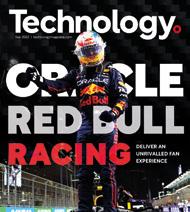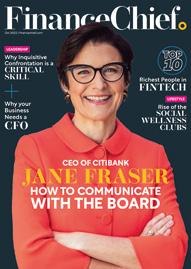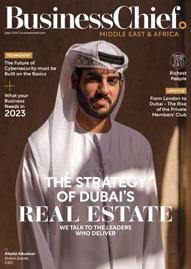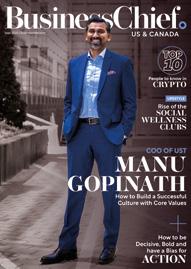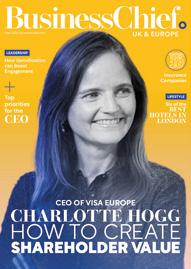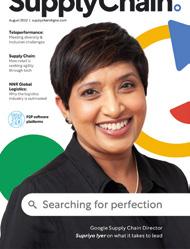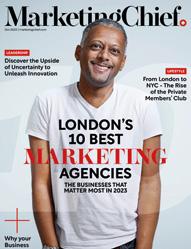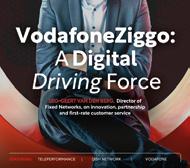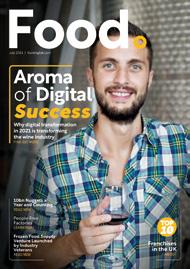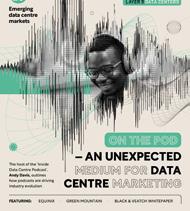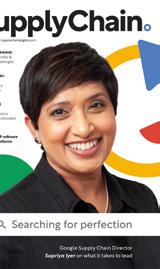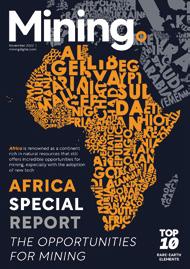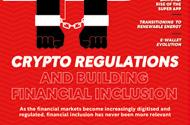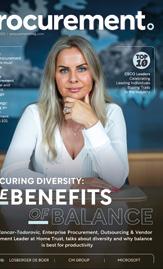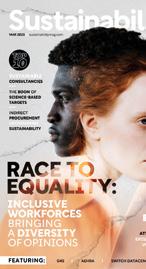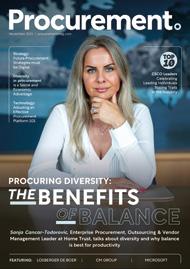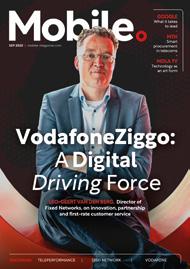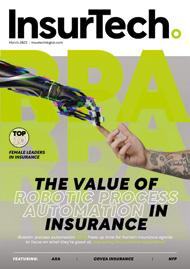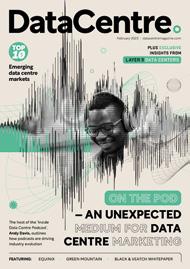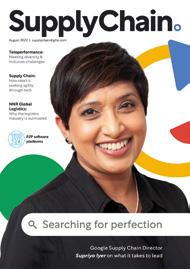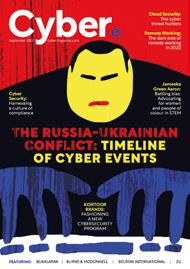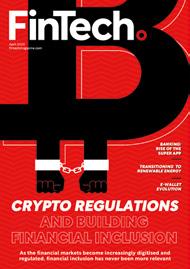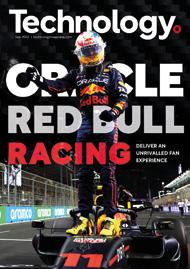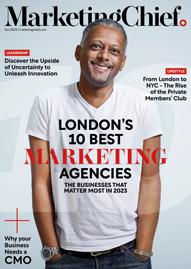






































































































More people are transacting online than ever before, with 92% of consumers expecting a frictionless and secure experience while shopping online1.
More people are transacting online than ever before, with 92% of consumers expecting a frictionless and secure experience while shopping online1.
Ecommerce companies and payment services providers must constantly innovate to create a seamless customer experience while keeping fraudsters at bay. Leading ecommerce platforms leverage Ekata’s real-time identity insights to balance customer experience with the business risk that can erode their bottom line.
Ecommerce companies and payment services providers must constantly innovate to create a seamless customer experience while keeping fraudsters at bay. Leading ecommerce platforms leverage Ekata’s real-time identity insights to balance customer experience with the business risk that can erode their bottom line.
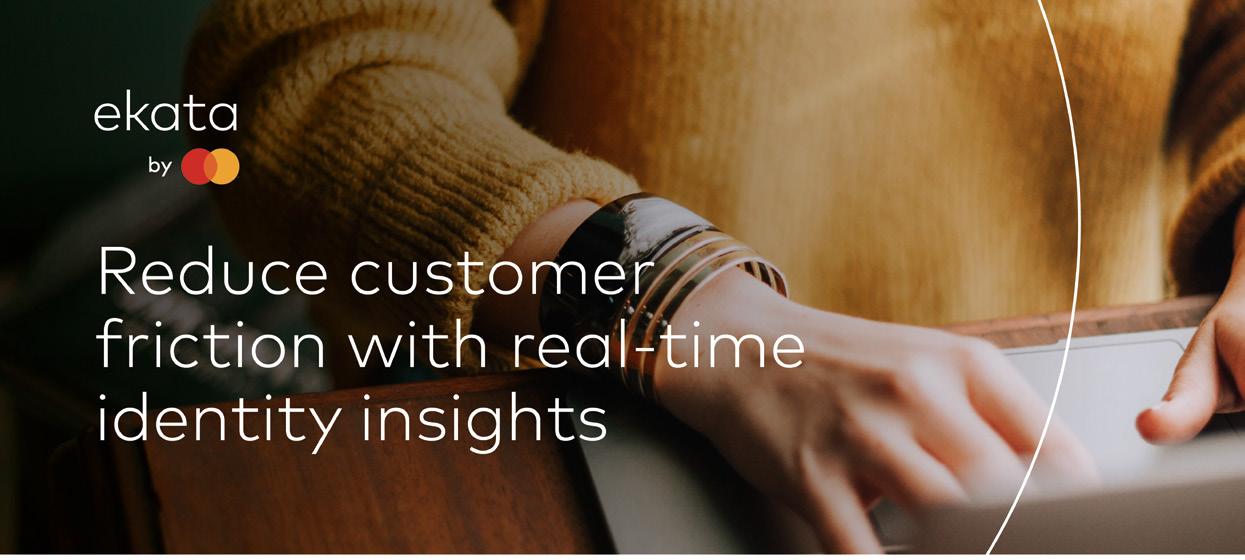
Ekata, a Mastercard company, uses sophisticated data science and machine learning to fuel global payments and ecommerce companies with identity verification data that empowers them to reduce friction, maximise approval rates, and fight payment fraud in every transaction.
Ekata, a Mastercard company, uses sophisticated data science and machine learning to fuel global payments and ecommerce companies with identity verification data that empowers them to reduce friction, maximise approval rates, and fight payment fraud in every transaction.
WWW.EKATA.COM
1According to VansonBourne, 2020, “Infinite want: Consumers demand speed and security in the digital experience.” https://www.vansonbourne.com/work/29081801ep
WWW.EKATA.COM
Use more image captions as often as possible
1According to VansonBourne, 2020, “Infinite want: Consumers demand speed and security in the digital experience.” https://www.vansonbourne.com/work/29081801ep
EDITOR-IN-CHIEF
ALEX CLERE
CHIEF CONTENT OFFICER
SCOTT BIRCH
MANAGING EDITOR
NEIL PERRY
CHIEF DESIGN OFFICER
MATT JOHNSON
HEAD OF DESIGN
ANDY WOOLLACOTT
SENIOR DESIGNER
MIMI GUNN
FEATURE DESIGNERS
REBEKAH BIRLESON
SAM HUBBARD
SOPHIE-ANN PINNELL
HECTOR PENROSE
ADVERT DESIGNERS
JORDAN WOOD
CALLUM HOOD
VIDEO PRODUCTION MANAGER

KIERAN WAITE
PRODUCTION DIRECTORS
GEORGIA ALLEN
DANIELA KIANICKOVÁ
PRODUCTION MANAGERS
JANE ARNETA
MARIA GONZALEZ
CHARLIE KING
YEVHENIIA SUBBOTINA
MARKETING MANAGER
EVELYN HOWAT evelyn.howat@bizclikmedia.com
PROJECT DIRECTORS
JAKE MEGEARY jake.megeary@bizclikmedia.com
JACK MITCHELL jack.mitchell@bizclikmedia.com
MEDIA SALES DIRECTOR
JAMES WHITE james.white@bizclikmedia.com
MANAGING DIRECTOR
LEWIS VAUGHAN lewis.vaughan@bizclikmedia.com
CEO GLEN WHITE
ere at FinTech magazine, we are proud to once again be an official media partner and exhibitor at Money20/20.
This is a great chance for us to catch up clients and make new partnerships, and it’s also an opportunity for you to get to know us better.
This special supplement showcases some of our work that we do – exclusive interviews with some of the biggest names and brands in finance. It’s what we do.
We also have our daily news and views website, weekly newsletters, virtual events, live events – not to mention a whole host of content solutions where we provide a complete end-to-end service.
From webinars to whitepapers, roundtables to company reports – we’ve got all your bases covered.
It’s great to be back in Amsterdam, and we look forward to seeing you at Stand D190 where you can meet with our marketing team or share your insights with our on-site editors and film crews.
And while your focus will rightly be on Money20/20, mark your calendar and save the dates 8-9 November 2023 for FinTech LIVE in London. We will be welcoming thousands of fintech leaders and innovators to our stages to share their views on the future of the industry, in a series of keynotes, roundtables, workshops, and firesides.
Alternatively, if you like what you see inside these pages, check out our digital magazine editions, including bespoke video interviews, by visiting fintechmagazine.com
EDITOR-IN-CHIEF
ALEX CLERE
alex.clere@bizclikmedia.com
@alex-clere
fintechmagazine.com
@fintech-magazine-bizclik
@FinTechMagazine
bizclikmedia.com © 2023 |
@FinTechMagazine

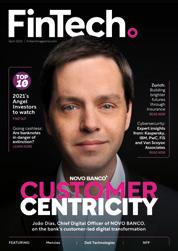
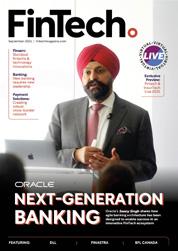
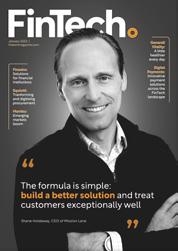
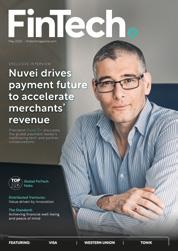
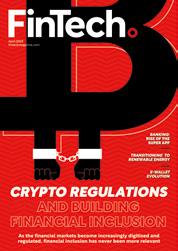
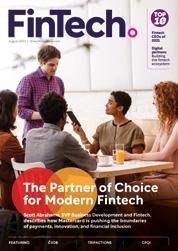


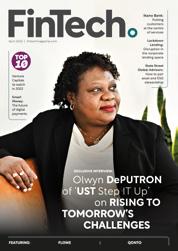
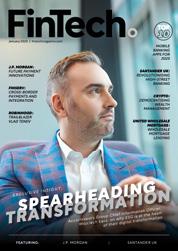

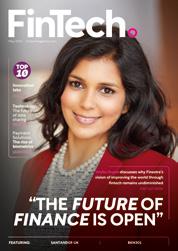


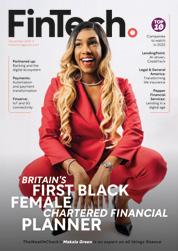

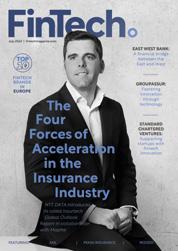
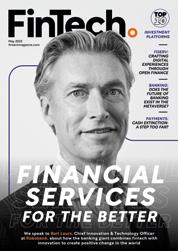
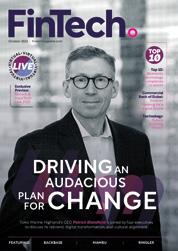

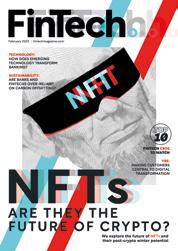
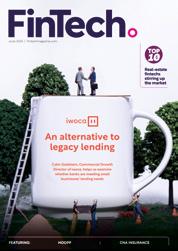
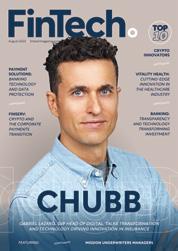
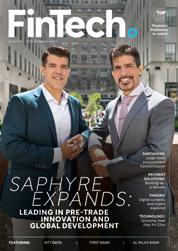
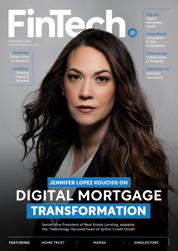


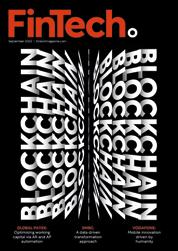
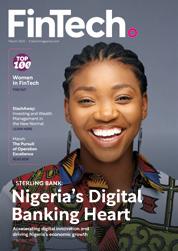
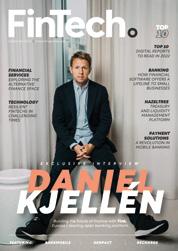

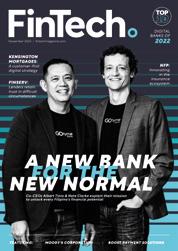


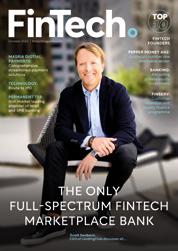

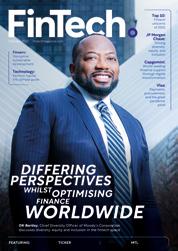







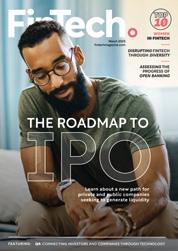


FinTech magazine is an established and trusted voice with an engaged and highly targeted audience of 113,000 global executives
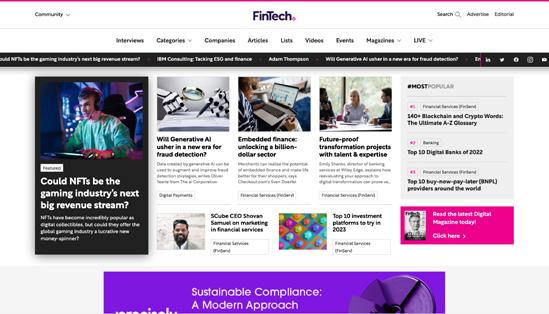
Digital Magazine
Website Newsletters
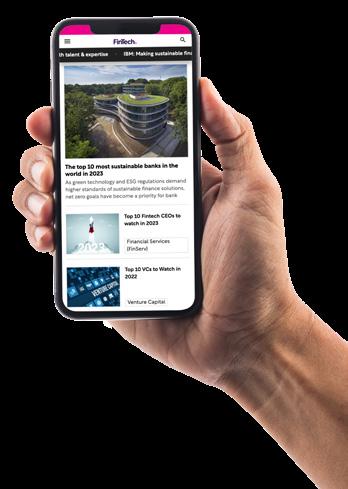
Industry Data & Demand Generation
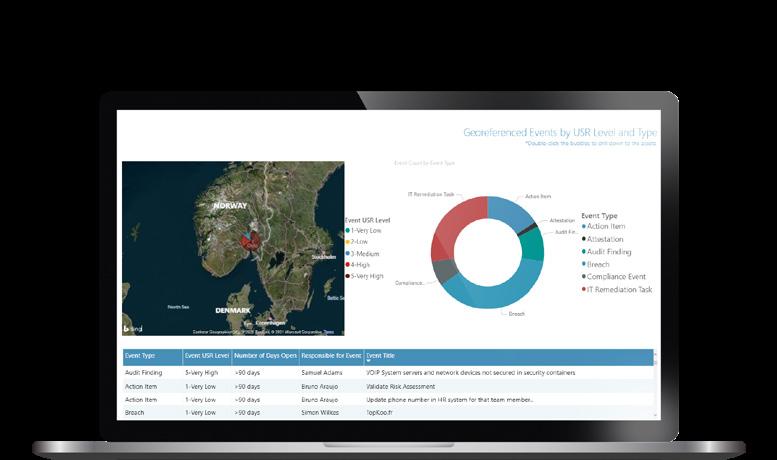
Webinars: Creation & Promotion
White Papers & Research Reports
Lists: Top 10s & Top 100s
Events: Virtual & In-Person
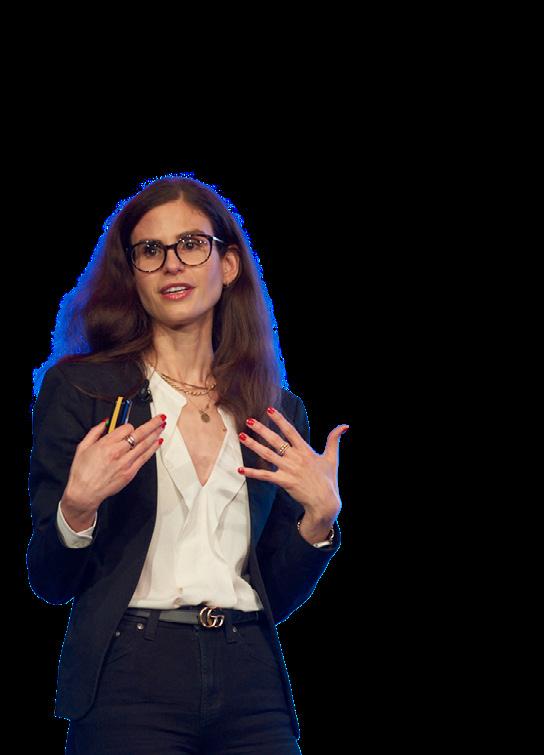
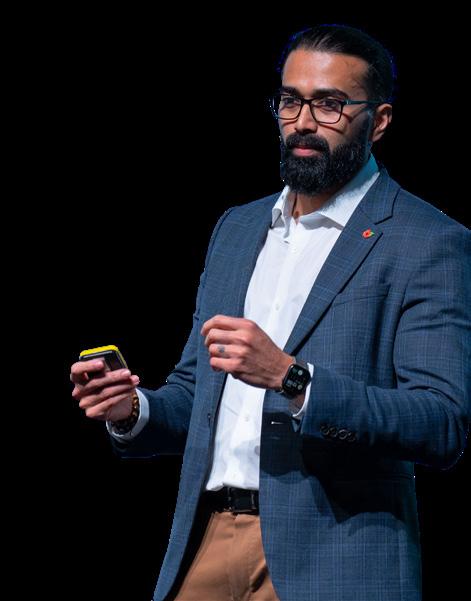
WORK WITH US

If this is your first time at Money20/20, leave your preconceptions of business events at the door. Industry conferences don’t have to be boring, Money20/20 has flourished into a fintech fiesta.

J.P. Morgan utilises a full arsenal of technology, including on-blockchain data exchange. Christine (Jang) Tan, Head of FIG Sales APAC, talks to us from her office in Singapore about her push in redefining the future of finance.
Rabobank is generating positive social change in the agri-food and energy sectors by doubling down on its commitment to innovation. Bart Leurs, Rabobank’s current Chief Innovation and Technology Officer, talks strategy.

With the current turbulent economic times, Mambu’s SaaS solution is helping financial institutions act quickly, launching and scaling products at speed. Nick Lawler, Mambu’s Market Sales Director for UK&I, explains.

Women to Watch in 2023
Women are taking an increasingly central role at the helm of established global corporations and dynamic startup companies, propelling change in fintech.

The Event Disrupting FinTech, InsurTech & Crypto
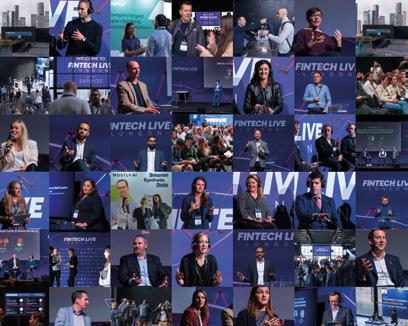
The UK's fastest growing Fintech event comes to you on 8-9 November from the QEII in London.
The Fintech Disruptor Making Smarter Trading Simple The finance industry is catching on to Saphyre’s secret sauce and realising the opportunity to gain competitive advantage with AI-powered trading tools.

Chris Comparato, CEO of Toast
The point-of-sale platform for over 79,000 restaurants world-wide.
Crafting New Digital Experiences Using Open Finance
Fiserv is helping clients, including fintechs and global brands, unlock new revenue streams with solutions that reach virtually every US household.
Path to IPO: Liquidity in Private Capital Markets
Morgan Stanley at Work is helping to create a new roadmap for private and public companies seeking to generate liquidity.
How Fidelity Brings Digital Assets to Institutional Clients
Informed by customer demand, Fidelity International has backed itself to create innovative investment products for institutional clients.
Daumantas Dvilinskas, CEO of TransferGo
With first-hand experience of how difficult crossborder transactions can be, Dvilinskas shares how he's used this to his advantage.



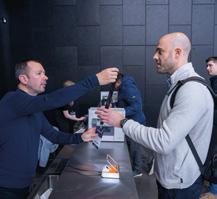












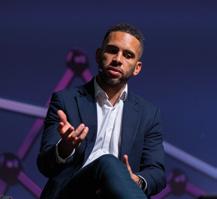







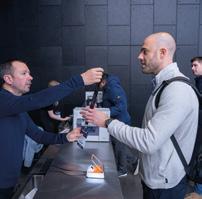
















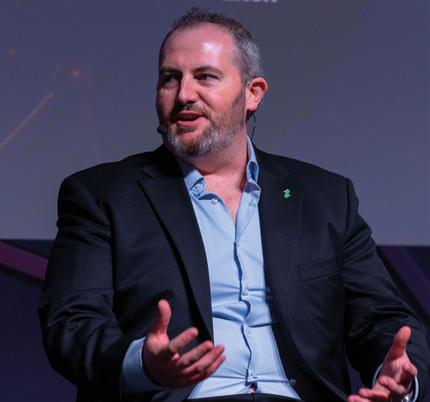
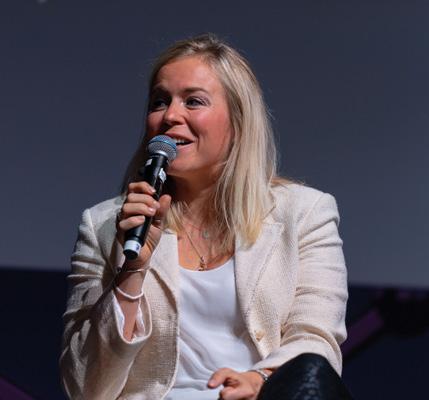
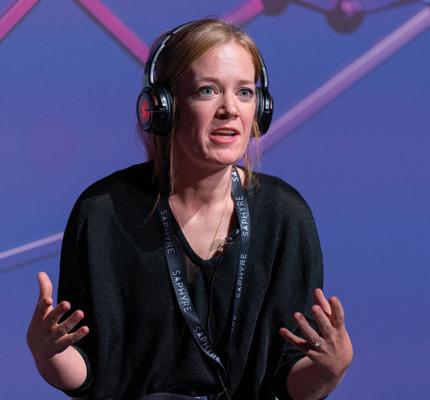







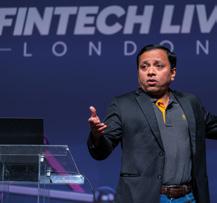
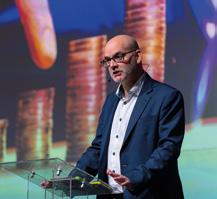















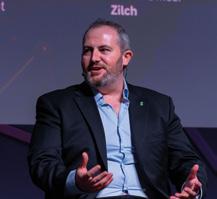

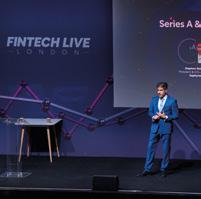
























 WRITTEN BY: SCOTT BIRCH
WRITTEN BY: SCOTT BIRCH

If this is your first time at Money20/20, leave your preconceptions of business events at the door. Founded in 2012 with a view that serious industry conferences didn’t have to be boring, Money20/20 has flourished into a fintech fiesta.
The annual festival of finance returns to Amsterdam for three memorable days of executive insights, game-changing inspiration, and all-important networking.
So, congratulations for being here.
Money20/20 brings together the great and the good for the financial world, covering everything from banking to payments, and crypto to insurance. As well as attracting a wealth of disruptive startups, Money20/20 this year welcomes senior executives from giants including HSBC, JP Morgan, Visa, Mastercard, Morgan Stanley, UBS, ING, Barclays, ABN Amro, and Citi.
“We are thrilled to welcome such powerhouses to our stages and throughout the show this year. These companies are coming to lead, transform and flip the script on every front of our fintech expectations. And
the speaker line-up is just the tip of the iceberg, the entire show will be one to remember,” said Money20/20 President, Tracey Davies.
“Money20/20 Europe is giving participants new content formats, new stages, and key experiences embedded throughout the show that will connect, inspire and inform them. We have worked hard to make sure we exceed everyone’s expectations with big opportunities, powerful learnings and unparalleled networking.”
Key themes and speakers at Money20/20 Europe 2023 include:

FINTECH GETS REAL Fintech is no longer a niche industry. It is now mainstream, and it is having a major impact on the way we bank, invest, and manage our finances.
SMOOTH INTERACTIONS
Making the customer experience as seamless and frictionless as possible. This is being done through innovative technologies, such as artificial intelligence, chatbots, and biometric authentication.
7,500+ ATTENDEES
2,300+ ATTENDING COMPANIES
350+ SPEAKERS 380+ SPONSORS 90+ COUNTRIES REPRESENTED


11:00
B2B BNPL: Our Survey Says…
The Box, RAI
Anil Stocker, CEO and Co-founder of Kriya, is the speaker at this intimate, 45-minute session taking a deep dive into Buy Now Pay Later data. BNPL is a hot topic when it comes to consumer applications but relatively unsung in the B2B arena.
TUESDAY 6 JUNE
09:30
Introducing: Tuesday Fusion Stage, RAI
This is a great way to get a flavour of the day ahead, with this opening session providing a cheat-sheet for the day’s hottest talks, workshops, and pitches. Expect exclusive chats with some of the key speakers plus some special guests, too. You can also catch the early Introducing session on subsequent days of the show.
10:35
Cloud on Europe’s Terms: Sovereignty and Security in the Banking Sector
Fusion Stage, RAI
As we are all well aware, cyber attacks are on the rise and one of the top priorities for business leaders. This session will explore what sovereignty focus means for Europe’s financial sector, discussing links between sovereignty and cybersecurity, and the expectations of the markets and its regulators.
Speakers include Alexandra Maniati of the European banking Federation and Brent Phillips of Deutsche Bank, while the moderator is Georgina Bulkeley of Google Cloud.
This session allows the audience to get up close and personal with data, giving them the ability to ask questions, discuss and really understand at a high level the current opportunities and concerns. Note: only the first 40 people will be able to attend this session.
13:15
Banking On It: HSBC
UK CEO Ian Stuart Encore, RAI
Hear how HSBC worked to structure the SVB UK deal in record time from CEO Ian Stuart, why HSBC felt it needed to act fast to support the UK’s startups, and how he sees things playing out for European startups and banks as they build a new future together. Should be a fascinating session.


14:00
Gender Diversity in Blockchain and Crypto: Brining Women Onboard

The Box, RAI
Gina Ordonez Pari of Zimpler will explore the benefits of promoting diversity and inclusivity in the industry. She’ll also discuss how engaging more women can contribute to a larger user base and drive the growth and success of the industry.

15:05
Star(ling) Your Engines: A UK Export Success Story
The Close Up Stage, RAI
Rather than expanding into other markets, Starling has its own SaaS arm, Engine. In this intimate fireside chat, Starling CEO Anne Boden and Engine CEO Sam Everington discuss their progress, what the strategy entails and what the industry reaction has been so far.

16:00
FinTech Magazine's Happy Hour
Hall 1, Stand D190
You've had a busy day, so why not come and put your feet up at our stand for a well deserved beverage or two on us!
16:30
Fintech + Travel: An Unexpected Journey
Fusion Stage, RAI Research shows that consumers plan to prioritise spend on travel even as other discretionary spend areas come under pressure.
Consumers are also open to new fintech experiences in travel like BNPL and Foreign Exchange services to travel more flexibly. This panel session will draw on insights from some of digital travel's hottest innovators to explore how fintech and payments innovation are improving the customer experience and driving new growth.
10:42
Welcome to the Age of Centaurs: Hundred-Million Lessons for Startup Success
Money-Bot, RAI
They run a tight schedule at Money20/20, which is why this session is due to start at an irregular time. However, this session is about time, specifically the changing nature of it. It’s been nine years since Aileen Lee coined the term ‘unicorn’. Get ready for the next generation, as Money20/20 Wizard Sanjib Kalita heralds the dawn of a new era, where sustainable success takes precedence over glittering valuations. Welcome to the Age of Centaurs.




13:00
Future of Money 2035

The Box, RAI Hamish Thomas of Deloitte shares four possible scenarios ahead on the journey to 2035 and the future state of Money and Payments.


Alongside the longer range perspectives, understand significant near-term change that Deloitte can foresee. This session is especially relevant to retailers, tech companies, governments and regulators, covering potential responses to anticipated opportunities and challenges.
15:00
Europe's Got Access (Winner announcement)
Encore, RAI
Find out which climate-focused startup will walk away with US$100,000, in this contest backed by Commerce Ventures.
15:37
Generative AI within Fintech & Financial Services
The Summits, RAI
There is no escaping ChatGPT and generative AI, but what does it mean for banking and fintech? Discover from leaders at BBVA, Swift and NVIDIA how banks and fintechs evaluate generative AI, which applications they embed with AI first, and why waiting to invest is not an option.
10:05
Europe’s Formula for Supporting
Female Founders in Fintech Elements, RAI

Fun fact – Europe produces more female fintech founders than anywhere else.
This panel features female founders, co-founders and VCs discussing what needs to be done to level the playing field for women across the globe.
11:00
16:00
If you missed us yesterday, swing past and say hello!
16:20
What's Sharia Got to Do With It? New Banking Solutions for an Evolving Muslim World Money-Bot, RAI Europe is home to more than 40 million Muslims who remain underserved. From halal investment products to sharia-compliant banking solutions, this session explores why it's critical for banks and fintechs to understand the unique needs of Muslims.
The Impact of Quantum Computing on Banking, Payments and Financial Services Outer Limits, RAI
The speakers in this session from IBM explore what quantum computing means to the payments industry, and to bank and corporate CIOs and CPOs as they try to stay ahead of security threats and risks.

14:45
Marketing on a Changing Frontier: CMO Strategies to Succeed Elements, RAI





In uncertain times, CMOs need a clear vision, and this panel aims to provide you the insight required to prioritise marketing efforts.
The discussion brings FinTech and Financial Services marketing leaders together, sharing their experiences, best practices, case studies and real-life examples on visionary perspectives.
Fintechs are facing a number of strategic challenges, like how to compete with traditional banks, how to manage risk, and how to scale their businesses. Hear from top execs how they overcome these hurdles.
Showcasing the shift from a centralised to a decentralised model of ownership.
The frontline battle for customer attention is being fought on the front end. In the past, financial institutions focused on building robust back-end systems. However, in today's digital world, the front-end experience is just as important, if not more so.
“We are proud to present an agenda designed to help the industry build bridges from the challenges of right now to the incredible opportunities of what is next. Money20/20 Europe is the place where money does business. We can’t wait to open
the doors to the RAI Amsterdam Convention Centre on June 6th, fueling the industry with inspiration, knowledge sharing, genuine in-person connections and so much more,” said Tracey Davies, President of Money20/20.

Green finance also takes centre stage this year, with the Champions of Change – plus seven influential fintech leaders

As the name suggests, the Money20/20 panel of investors has selected the best startups to showcase their propositions on stage. Don’t miss out on the Next Big Thing. Watch out for a series of 10-minute pitches on The Close Up Stage
presenting or moderating sessions as part of the programme. They include:
• Dr. Ruth Wandhofer, Executive Director and VC partner at Gauss Ventures
• Maria Prados, Head of Vertical Growth at Worldpay
• Mary Agebsanwa, Fintech Growth Lead at investment technology provider Seccl
• Maarten Stolk, Co-founder and CEO of Deeploy
• Gerrit Sindermann, Deputy Executive Director at Green Digital Finance Alliance
• Joanne Dewar, Vice Chair for Global Processing Services
• Aydan Al-Saad, Creator at the startup European Income
“The Champions of Change is a team of influential, passionate thinkers with impact and purpose beyond the norm, leading and disrupting everything from green finance, financial inclusion and explainable AI,” said Davies.
FinTech magazine was a media sponsor at last year’s gathering and has a significantly increased presence in 2023 – that’s inflation for you. But seriously, as FinTech’s global audience and stature has grown over the last 12 months, it seemed a logical move to come back bigger (check out our stand in Hall 1/D190)
FinTech is a fast-moving beast, and many of the CEOs and founders we interviewed in 2022 have already moved on or moved aside due to rampant M&A activity in the sector. If you want to showcase your company to our community, get in touch by contacting james.white@bizclikmedia.com or simply drop by the stand.
As well as this mega Money20/20 Europe event, Money20/20 USA takes place 22-25 October 2023 in Las Vegas.
Even bigger than its European counterpart, Money20/20 USA is the world’s biggest, most influential gathering of the global money ecosystem. It’s Money20/20 Europe, just bigger.
The theme of the USA event sounds like a threat or an opportunity, depending on your perspective – 2023: A Reckoning Is On The Horizon.
The agenda focuses on four distinct chapters addressing what’s happening now and where the industry is going next:
• Trust & Uncertainty
• Creative Destruction & A Technological Renaissance
• Age of Fundamentals
• It’s Time to Build (Utility)
Here’s something to get excited about. After a break of five years (yes, you read that right, five years) Money 20/20 makes a triumphant return to Asia in 2024.

Being held in Bangkok, Thailand, for the first time, your favourite finance event was last held in Singapore in 2019 at the Marina Bay Sands, with the 2020 event cancelled due to COVID-19.
Money20/20 Asia connects the entire Asian money ecosystem from banks, payments, tech, startups, retail, fintech, financial services to policy, and more. From in-depth analysis and inspirational speakers to hours of structured and unstructured networking opportunities, you will walk away with business-critical insights and new connections to help you stay ahead.
And, it’s in Bangkok. What’s not to love?
See you there from 23-25 April 2024.

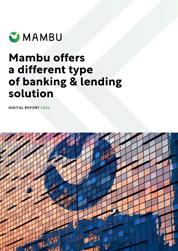
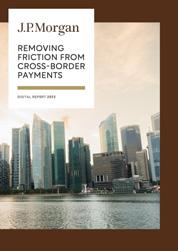

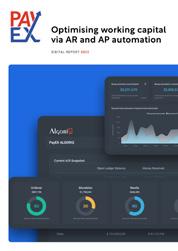
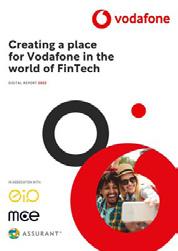

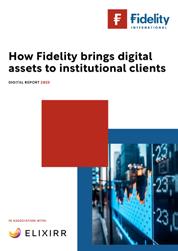
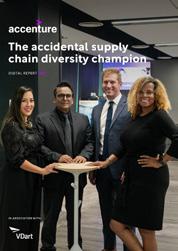
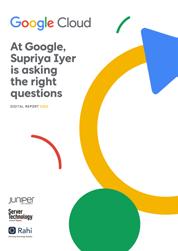
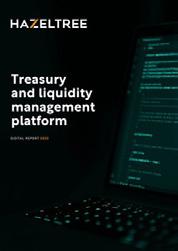
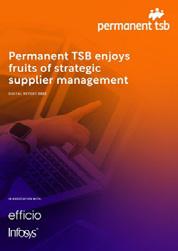
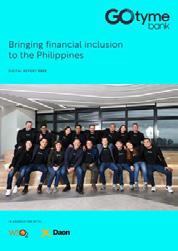
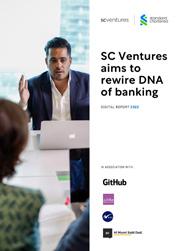
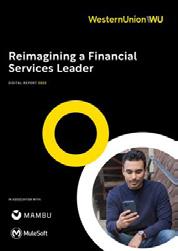
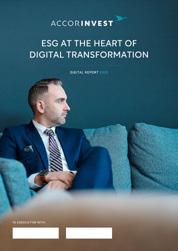
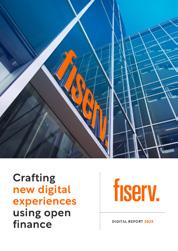
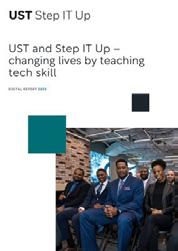

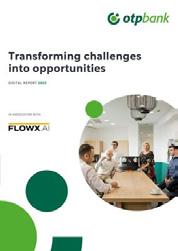
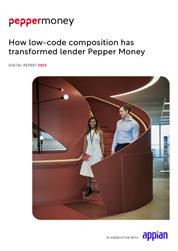

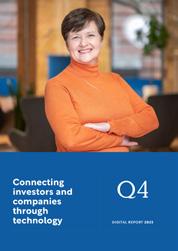
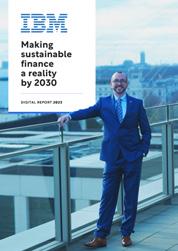
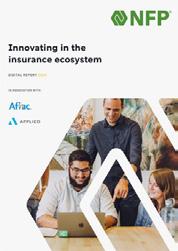
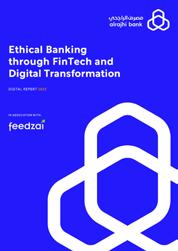
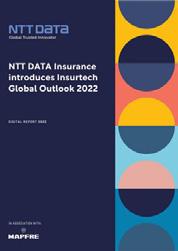
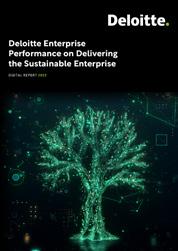

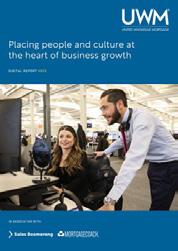

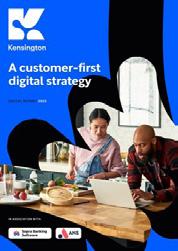
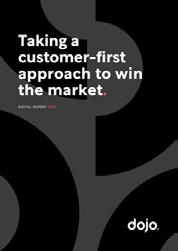
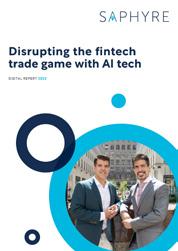
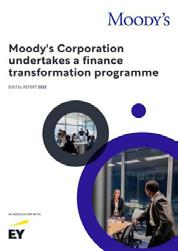
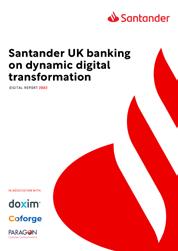
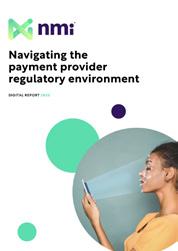
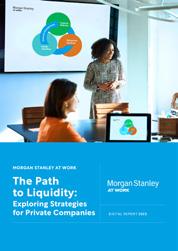

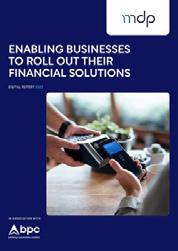

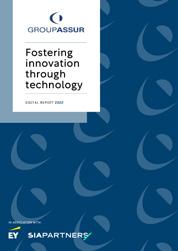
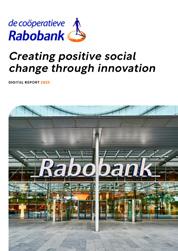
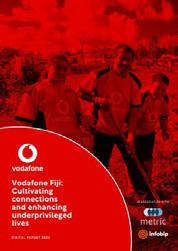
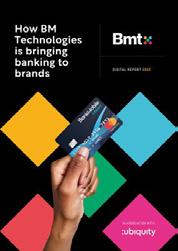

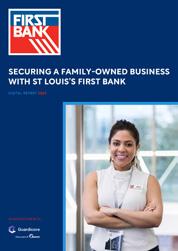
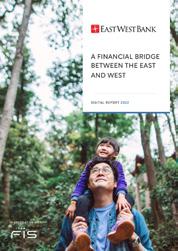
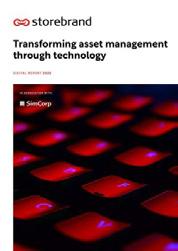

f you lived on planet Earth during the pandemic – or any time since, for that matter –chances are you ordered in. With restaurants shuttered and social distancing rules in place, many of us took advantage of the speed and convenience of food delivery. It’s a growing trend and a market that’s expected to be worth as much as US$430bn globally by 2030.
Along with the rapid rise of digital payments, it is one of the consumer demands that is driving a technological revolution in the restaurant business. One company that is helping to serve restaurants and meet those needs is Bostonbased Toast, which has been on an
astronomical ascent since it was founded in 2011. The company has raised more than US$900m in funding since the beginning of 2015 – during which time it has been led by one man.
Chris Comparato has an extensive background leading high-growth SaaS companies, which explains why he was such a good fit for the top job at Toast when he was appointed in February 2015. Before Toast, he led all customer success functions at Acquia and Endeca, as well as roles at consulting firms Keane and Cambridge Technology Partners.
When the COVID-19 pandemic hit, Toast was doing well. Revenue had increased by more than 100% year-on-year, and the firm had just raised US$400m in its largest funding round to date led by the likes of Bessemer Venture Partners and Tiger Global Management. It was a stern test – not just for Toast, but for its merchants too, who were already having to adapt rapidly to dining habits in constant flux.
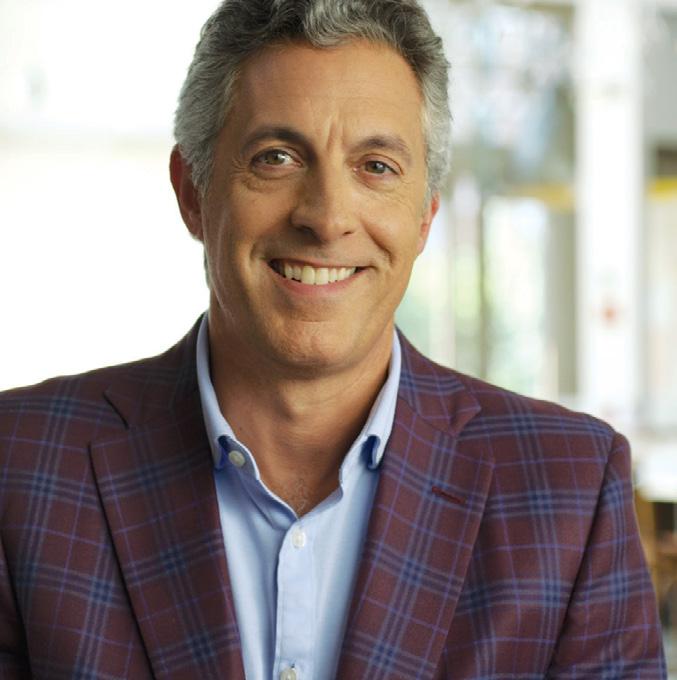
Following a turbulent few years, restaurants are under pressure to move with consumer habits and offer fantastic experiences online and off. Toast is one of the companies helping them do it
“We enable restaurants to deliver fantastic experiences to guests, freeing up their time and energy to do more of what they love”
“If you look at the course of the last two-and-a-half years, the restaurant industry has been incredibly resilient,” Comparato told CNBC earlier this year. “We’re making sure that our merchants and restaurants are ready to adapt and be resilient. Restaurants continue to struggle with staff shortages, food inflation, and how to engage their team. Our platform helps our customers strengthen their position on those three dimensions.”
Despite the challenges of the past few years, restaurants are beginning to bounce back. More consumers are dining out again,
and food delivery is a long-term trend that will prevail because of its overwhelming convenience to customers. Inflation poses a new threat – both in terms of business rates, but also consumer budgets facing greater pressure – though research from restaurant marketing company Popmenu suggests that almost 60% of US consumers were dining out more last year, despite rising menu prices.
Toast continues to add more restaurants
Toast’s system helps restaurateurs to reduce ticket times by up to
40%, connecting the kitchen with the front-of-house to ensure that no tickets are lost and orders are picked up accurately. A bill-splitting feature allows diners to share the cost of a meal with others at their table, while handheld units let waiters put down their pad and pen.
Toast is trusted by nearly 80,000 individual restaurants, having added another 23,000 net new locations last year. It’s not just for big chains; even for small franchises, Toast can help realise productivity savings and empower staff to turn over tables more quickly.
Explaining the value that Toast brings, Comparato recently told the Entrepreneur podcast: “Our platform enables restaurant operators to deliver great guest experiences, whether it’s ordering off-premise through online ordering; whether it’s ordering takeout; whether it’s having a tremendous dining experience within the restaurant. We enable restaurants to deliver these fantastic experiences. We want to make sure that we’re freeing up their time and energy to do more of what they love.”
Today, Toast is a public company, having listed on the New York Stock Exchange in September 2021 as part of a successful IPO that valued the company at US$20bn and made all three of its original founders billionaires.
As for Comparato, he continues to lead the business as it recruits even more restaurants into the Toast ecosystem – or Toasters, as the company calls them. His name gives some clues to his Italian heritage, and subsequently his favourite type of cuisine when he decides to eat out. “Italian of course,” he says.

“Restaurants have been incredibly resilient but they continue to struggle with staff shortages, food inflation, and how to engage their team”
 WRITTEN BY: ALEX CLERE
WRITTEN BY: ALEX CLERE


1 Expected estimates on number of institutions, number of accounts and number of corridors on Confirm are calculated based on projections from market research and incoming clients in Confirm’s pipeline and are subject to change. 2 All estimates on number of institutions, number of accounts and number of corridors include data from J.P. Morgan as a Responder and Inquirer on Confirm.

When Christine (Jang) Tan talks to us from her office in Singapore, she has just returned from Sibos – the landmark financial conference held in Amsterdam. It’s a major event for J.P. Morgan. Indeed, several of the company’s executives participated in panel discussions and debates at the conference, held in person for the first time in three years.
J.P. Morgan showcased Confirm powered by LIINK, a global account validation service designed to enhance the efficiency of cross-border payments. Confirm runs on the ONYX platform, the firm’s blockchain division. Confirm is the world’s first bank-led, production-grade, peer-to-peer blockchain network that has the ability to verify over 2bn bank accounts from over 3,500 financial institutions1,2
“We are propelling solutions that address the demands of customers globally – that means they need to be agile, nimble and frictionless,” says Jang. “We have that ability, as we can leverage global infrastructure and incorporate local best practices to our solutions, customising them to the specific client and industry segments, including strategic partnerships to enable an end-toend payments ecosystem. We also featured our cross-currency proposition customised for banks, fintechs, corporates, and non-bank FIs.”
J.P. Morgan, led by the ONYX team, also attended the Fintech Festival in Singapore. As a key foreign bank, the team is working closely with various central banks around the world, including the Monetary Authority of Singapore. The aim of this is to support new areas of innovation leveraging blockchain technology, with the goal of enabling the movement of money to be faster, better, more cost effective, and take place in a secured manner.
Jang works in J.P. Morgan’s Payments business, heading up Financial Institutions Group Sales in APAC. Not only is Payments a key part of J.P. Morgan’s push in redefining the future of finance, APAC is also a region that has historically been at the forefront of innovation with real-time payments and continues to be a torchbearer to this day.
Impressive credentials underline J.P. Morgan’s scale “We operate with in-country presence in 16 markets,” Jang says. “We support 18 markets from a client segment standpoint within Asia.”
And then of course they move their flows on a global basis. In APAC alone, the Payments business operates hubs in Manila and Mumbai, which facilitate some of the treasury services and trade processing that J.P. Morgan carries out on behalf of its clients.

J.P. Morgan is regarded as the number one US dollar clearing bank globally, processing almost US$10tn a day in payments.
With such large volumes at stake, the company is keenly aware of its responsibilities around cybersecurity and protecting clients’ money. “That cybersecurity aspect is very critical and in our connections with all the banks, that's one of their key priorities – to have not just a trusted partner who innovates, but the ability to
execute securely,” Jang says. “That's very critical, particularly in Asia where you've got a lot of central banks as well as regulators and a complex landscape.”
Sheer volume means cyber becomes key focus
That duty of care comes with expected levels of best practice: large financial institutions and emerging fintechs alike expect their partners to act impeccably, particularly when it comes to complying with legal and regulatory obligations or safeguarding systems from attack. “While we do share best practices, we also expect the same in terms of the companies [that we partner with] actually adhering to certain standards. It's really to protect the entire community.”
When she looks at how J.P. Morgan is likely to invest its resources in the future, Jang says: “We have to keep developing, and there has to be a cyber component that we continue to invest in. On blockchain, the use
cases will continue and we've leveraged Confirm as one of our applications for banks, non-bank financial institutions, corporates and fintechs to use.
“We also just recently had the announcement with VISA B2B, who will be leveraging Confirm to facilitate their payment flows cross-border as well.”
When you’re working at such an astronomic level, it takes some bright-shining stars to inspire you. Within J.P. Morgan, Jang says she looks up to Takis Georgakopoulos, the Global Head of J.P. Morgan’s Payments division. “He was previously my boss when he ran the MNCs Corporate Banking business, and brings a unique strategic background to his current role. His vision of bringing together four discrete businesses under a single Payments umbrella is what differentiates us today, enabling the bank to provide end-to-end pay-in, pay-out cash management and trade finance capabilities to our clients. Today, we process almost US$10tn in
CHRISTINE (JANG) TAN HEAD OF FIG SALES APAC, J.P. MORGAN PAYMENTS
“THE CYBERSECURITY ASPECT IS VERY CRITICAL AND IN OUR CONNECTIONS WITH ALL THE BANKS, THAT'S ONE OF THEIR KEY PRIORITIES”
TITLE: MANAGING DIRECTOR, HEAD OF ASIA PACIFIC – FINANCIAL INSTITUTIONS GROUP (FIG) SALES, PAYMENTS

Christine (Jang) Tan is Managing Director and Head of Asia Pacific – Financial Institutions Group for J.P. Morgan Payments, based in Singapore. In this role, she has leadership responsibility for banks, broker-dealers and non-bank financial institutions portfolios across the region, providing strategic advice and growing the business with both existing and new clients.

Prior to this position, Christine was Head of Treasury Services, ASEAN responsible for embedding the end-toend Treasury Services model across Indonesia, Malaysia, Pakistan, Philippines, Singapore, Thailand and Vietnam, ensuring resilience and robustness in product offering, service model and control environment. She was also Head of Multinational Corporates (MNCs) for Asia Pacific for five years and has a wealth of MNC experience in the region across multiple key markets.
Christine joined J.P. Morgan from Bank of America Merrill Lynch (BAML), where she was Head of Regional Treasury Sales for South Asia, with responsibility for developing and executing the sales strategy for pan-Asia subsidiary businesses of multinational clients and for large corporates in the region.
Prior to her time at BAML, Christine spent 12 years at Citi in a number of regional roles, including head of the Hong Kong Global Subsidiaries Group.
Christine also worked as an analyst covering Asian airlines and airports earlier in her career, where she also engaged in aircraft financing through structured trade finance, global cash management and fuel hedging for airlines.
Christine holds a Master of Business Administration and a Bachelor of Science in Business Administration from the University of Kansas.
payments daily in more than 120 currencies and over 160+ countries across the world, and we’re only getting started on this journey.”
A Singaporean native, Jang takes inspiration from the country’s late founding father and first prime minister, Lee Kuan Yew, as well. “Mr. Lee put Singapore on the map, and the financial services industry thrived under his leadership,” Jang says. “It's been growing as a key financial hub globally so I’m really inspired by his journey running the country.”
Within its payments business in APAC, J.P. Morgan takes an approach that Jang calls the ‘three Cs’: client, collaborator and competitor.
On a client side, the firm is obsessively focused on
innovating to support its clients with the rollout of new features and functionality. J.P. Morgan is a co-founder – alongside Singaporean bank DBS and sovereign fund Temasek – of an entity called Partior. The vision for Partior is to facilitate multi-bank settlement on the blockchain in multiple currencies. The firm has facilitated live transactions settling Singapore and US Dollars, and is in the process of adding settlement banks to facilitate additional currencies – including Euros, Japanese Yen and Chinese Renminbi.

For J.P. Morgan, collaboration is key to growth in the Payment business. A prime example is the partnership with European car manufacturer Volkswagen to create Mobility Payments Solutions, focused on the future of cars and how payments can drive innovation
through the auto segment. The company continues to look at additional partnerships that it might leverage in Asia – whether that’s with fintechs, aggregators, financial institutions, nonbanks or corporates. The firm also conducted strategic acquisition and alliances with Cleareye.AI, and the latest in-region partnership was with In-Solutions Global (ISG), a leading payment solutions provider.
“Those are collaboration aspects where we would look at whether we want to partner with them, invest in them, and then leverage their technology to support our solutions at the end of the day,” Jang explains.
Finally, on competition, J.P. Morgan does not allow its size or scale to cloud its judgement of rivals in the market. “Clearly we do face competition, with fintechs these days becoming more prevalent,” Jang elaborates. “But I do think having competition is healthy. Ultimately, it’s about benefitting the consumers who have the ability to choose their payment
CHRISTINE (JANG) TAN HEAD OF FIG SALES APAC, J.P. MORGAN PAYMENTS
“WE BELIEVE THAT SEAMLESS AND SECURE PAYMENT SOLUTIONS CAN HELP OUR CLIENTS AND THEIR BUSINESS… TO GROW, DIVERSIFY, AND THRIVE”
options – whether it's through banks, wallets or fintechs. And J.P. Morgan wants to be part of partnerships that deliver for clients.”
Blockchain a key driver behind payments
Jang is a firm believer in the possibilities brought about by blockchain, and expects the decentralised technology to form a key pillar of J.P. Morgan’s strategy as the company prepares for the future of payments. Jang explains: “We are working globally on opportunities to leverage the technology and apply them to various requirements and solutioning – whether it's on the markets front, tokenisation, real-time movement of money and cross-border payments.”
In addition to using SWIFT and ISO as the payment rails for cross-border transactions, J.P. Morgan is seeking to improve the sharing of data in realtime with Liink – the world’s first bank-led, productiongrade, peer-to-peer blockchain network for information sharing
– and Confirm, an application for global account validation. This will reduce timescales for banks, cutting down on laborious tasks that need to be carried out manually while lowering rejection rates at the same time.
The company is working with a lot of different companies to facilitate crossborder exchange of that data into different corridors, particularly when it comes to demand for remittances associated with overseas
workers, who want to send money back home to markets like Indonesia, India, Bangladesh and Sri Lanka to support their family and communities. J.P. Morgan is expanding the service into the Philippines, Vietnam and Thailand.

As she looks ahead to a promising future – one in which J.P. Morgan will play an undoubtedly pivotal role – Jang neatly summarises the pinsharp focus of its Asia Pacific payments team: “We believe that seamless and secure payment solutions can help our clients and their business to grow, diversify, and thrive by enabling rails for companies, financial institutions, and consumers to pay anyone by any method or channel from anywhere, anytime.” It’s not a straightforward brief – endusers want everything, and they want it now – but if any company has the track record behind it to make it happen, it’s J.P. Morgan. jpmorgan.com/payments


Banking Circle’s proprietary technology enables Payments businesses, Banks and Marketplaces of any scale to seize opportunities, compete and grow.
From multi-currency accounts to real-time FX, international payments to local clearing, we’re quick, low-cost, and secure.
Bypass old, bureaucratic and expensive systems and enable global banking services for your clients.

 WRITTEN BY: ALEX CLERE
WRITTEN BY: ALEX CLERE
To anyone well-versed in marketing speak, descriptions of a superlative nature are usually best avoided.
Anything that is the ‘biggest’, the ‘most’, or the ‘best’ is usually nothing more than corporate bluster and hype. But no matter which way you slice it, Fiserv is one of the largest and most significant players in financial technology.
First, take its reach: Fiserv does business in more than 100 countries, and, in the US, its products or services reach nearly 100% of households, either directly or indirectly through a financial institution, fintech, merchant, or biller. Then there’s the size of the business: Fiserv has 40,000 associates globally and serves thousands of financial institutions and millions of merchants and consumers. Finally, its impact is reflected in the range of financial solutions and services offered, spanning the full spectrum of banking and commerce.
When Head of Fintech and Growth Sunil Sachdev and President of Digital Payments Matt Wilcox join me to discuss the company’s growing focus on open finance, the two are united by a clear common cause. Simply put: leverage the expertise and innovation Fiserv has to help clients continue bringing new financial innovations to market, deepening relationships by adding more value for the consumers and businesses they serve.
“We have thousands of clients in the financial institution space, and millions of clients in the merchant and small business space. When we think about how we serve those clients every day, it’s all about earning their trust and ensuring that the products and services they have from us are performing. That’s paramount.”

The company’s success is testament to the transformational impact it has managed to achieve on behalf of its clients. Fiserv has a wide spectrum of clients including financial institutions, fintechs, enterprise merchants, and main-street merchants, as well as corporate entities all looking to increase engagement with their customers. The Fiserv approach to open finance helps define and accelerate its clients’ ability to innovate with new financial products and experiences, embedded directly at the point of need.
The talented people within the business help tailor approaches to individual clients, working with them
to understand their needs and lend a guiding hand – something that becomes increasingly valuable given the recent turmoil in the markets and general economic volatility.
“Based on the broad set of ledger, processing, acquiring, payments and data services we have at Fiserv, we continually advise clients on how they need to evolve their best-ofbreed offerings to stay competitive in a fast-moving regulatory and financial services landscape,” Sachdev explains. “We believe that makes Fiserv very unique. It would be harder and less cost effective for them to engage with multiple parties who may only be familiar with one specific area and not the bigger financial services picture.”
When asked who he admires or looks up to in life, Sachdev gives a wry smile. There is the touching deferential nod to inspirational
Fiserv is helping clients, including fintechs and global brands, unlock new revenue streams with solutions that reach virtually every US household
colleagues and bosses-gone-by –one of them being Ken Chenault, long-time CEO of American Express, where Sachdev worked for more than a decade. But then he admits to being a long-suffering New York Knicks supporter and a fan of the Rocky movie franchise.
“I guess I enjoy the underdog story,” he says. “There’s something about those types of stories that really highlights the excellence of people, whether they’re athletes or in other walks of life.”
This sentiment is pertinent to the role Fiserv plays in facilitating financial inclusion and increasing access to financial services through its products. Sachdev has an extensive background in banking and payments, working for fintechs both in the US and overseas. His travels have seen him put down roots in the UK, South Asia and India before returning to New York five years ago. This experience has given him a much richer insight into the challenges and obstacles that face consumers in other parts of the world.
“Living overseas and working in emerging markets really makes it personal for me to develop services
and capabilities that can lift people,” Sachdev states. “I feel like I draw on that quite a bit to help deliver some of the services that we’re thinking about delivering today.”
According to the World Bank, more than 1.4bn people worldwide remain unbanked, while the Federal Reserve reports that 22% of American adults (63mn) are either unbanked or underbanked – cut off from vital
financial services. Financial technology has a real power to elevate people, particularly underserved communities, and this is one of the reasons that Sachdev calls it a ‘privilege’ to show up for work each day.
“Fiserv is all about taking something from the whiteboard and bringing it to life,” he explains. “For me, that’s the best part of it – it’s about having an idea or identifying a problem, having a conversation with our clients and other market participants, being able to bring different subject matter experts together. Then we combine the technical pieces, commercial pieces and the go-to-market pieces to build a successful product or service to address that opportunity. That’s why I enjoy it. I don’t really think of it as work at all.”
Whether it’s a community bank leveraging fintech tools to better support the financial wellness of its customers, or a fintech leveraging Fiserv technology to bring these capabilities directly to market, Fiserv is bridging the gap to bring these scenariosto life at scale.

The business unit that Sachdev heads up – the fintech-focused team – was founded little more than a year ago. Before that, Fiserv was servicing fintechs in a siloed way, more often at a product level rather than a strategic one. Now, clients across a range of sectors that want to tailor financial services products for their various customer segments have a single entry point and are guided through their journey.
In turn, as the business unit matures, it is transforming to meet the needs of those clients. On any given day, Sachdev finds himself working closely with the varied talent that Fiserv boasts within its vast workforce. The goal is to integrate Fiserv services and capabilities and bring them to market in a more cohesive way, while modernising the tech stack to increase agility and accelerate time to market.
SUNIL SACHDEV HEAD OF FINTECH & GROWTH, FISERV
“FISERV IS ALL ABOUT TAKING SOMETHING FROM THE WHITEBOARD AND BRINGING IT TO LIFE. FOR ME, THAT’S THE BEST PART OF IT”
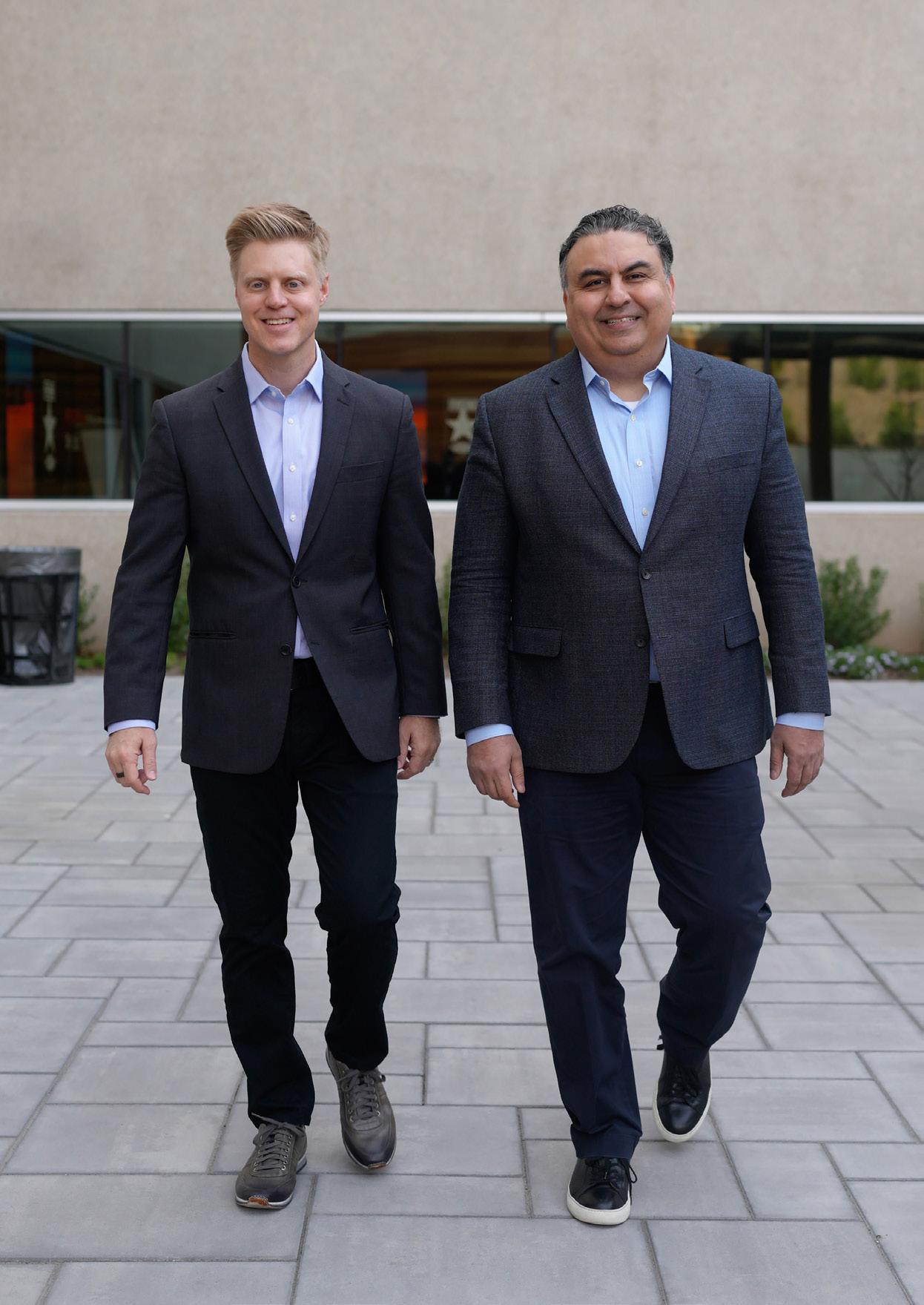 Fiserv’s Matt Wilcox, President of Digital Payments (left) with Sunil Sachdev, Head of Fintech & Growth (right)
Fiserv’s Matt Wilcox, President of Digital Payments (left) with Sunil Sachdev, Head of Fintech & Growth (right)
One thing that has aided in that pursuit is the Fiserv acquisition of Finxact, which was completed in April 2022. Leveraging the latest technologies, Finxact has developed a cloud-native, next-generation core banking platform designed to meet the scale and performance requirements of organisations of nearly any size. At the time of the acquisition, Fiserv President and Chief Executive Officer Frank Bisignano said the deal would “accelerate the ability of fintechs and financial institutions to deliver differentiated digital banking experiences to their customers” – something that Sachdev and his team spend a large part of their waking hours focused on.
Many financial institutions are choosing to run Finxact alongside their current banking core as a flexible platform to deliver new innovations and initiatives. A great deal of postacquisition investment has focused
on orchestrating a seamless backend experience to accommodate implementations that involve multiple systems of record.
For fintechs and other businesses leveraging Finxact as the banking-andpayments backbone for all types of creative use cases, the vast network of financial institutions served by Fiserv provides a ready source of sponsor banks to support these endeavours.

Fintechs can also tap into the power of the Fiserv network by offering their solutions to financial institutions through AppMarket, a digital marketplace where thousands of banks and credit unions using Fiserv core solutions go to access pre-integrated fintech innovations to expand their capabilities. With the high customer acquisition cost of direct-to-consumer models, many fintechs find that distributing their solutions through financial institutions can speed up time to revenue.
Part of the revolution behind open finance has been around data. Indeed, it would be almost inconceivable for the fintech use cases that are popular now to have ever existed were it not for consumers being able, and willing, to share their data through APIs. For Fiserv, open finance has been a way to accelerate innovation and increase industry collaboration.
As Fiserv has opened its ecosystem to support this revolution, financial institutions, fintechs and other businesses now have multiple ways to consume and connect with data. Developer Studio provides access to Fiserv restful APIs, including a workspace that gives developers instant access to begin working with core banking APIs. Financial data can be streamed from banking core platforms in real time, and cloudbased data storage provides a way to tap into deep and wide datasets on demand.
Fiserv also has built a data aggregation platform that brings together data from 18,000 sources, including financial institutions, a full biller network, brokerage and wealth
SUNIL SACHDEV HEAD OF FINTECH & GROWTH, FISERV“LIVING OVERSEAS AND WORKING IN EMERGING MARKETS REALLY MAKES IT PERSONAL FOR ME TO DEVELOP SERVICES AND CAPABILITIES THAT CAN LIFT PEOPLE”
TITLE: HEAD OF FINTECH & GROWTH
INDUSTRY: IT CONSULTING
LOCATION: UNITED STATES
Sunil Sachdev is a global fintech executive with a significant breadth of experience in banking and payments at companies such as American Express, Meed and Pershing. He has worked for Fiserv for nearly a decade in various roles and geographies. In recent years, he led the community bank segment, with a focus on enabling financial institutions to leverage modern technology to deliver differentiating experiences and improve time to market. Since 2021, Sunil has headed up the fintech segment, leading a team that has greatly accelerated the planning, execution and delivery of open finance and digital transformation capabilities across the enterprise.
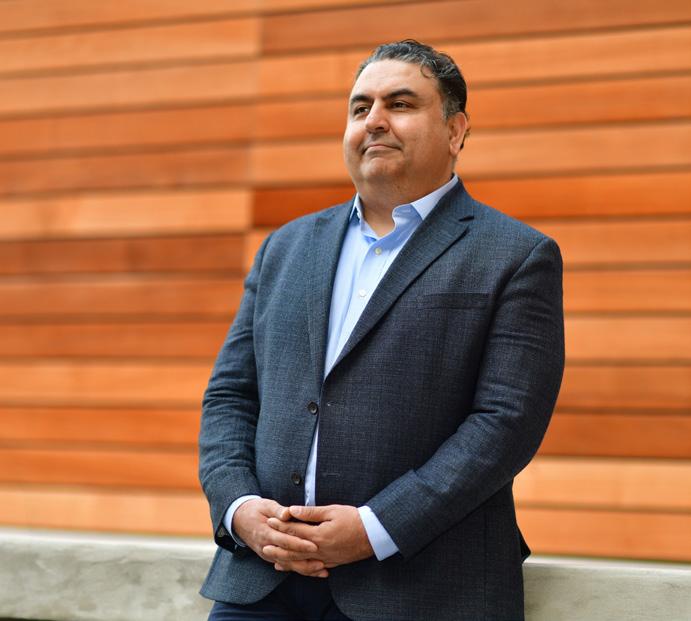
@sunil-sachdev-5128463
management houses. Providing consumer-permissioned access to this data creates the foundation for a growing number of open finance use cases.
“We’re starting to see the area of open finance really open up,” explains Matt Wilcox. Wilcox is President of Digital Payments at Fiserv and, as such, sits at the beating heart of fintech innovation – all of which begins with data. “We’ve seen a faster clip of innovation. And that’s starting to open the doors for industry collaboration. We’re working with countless companies where that opportunity exists now and there’s a faster path towards more open finance.”
Until now, innovation around open finance has largely been concentrated in other regions like Europe – but North America is slowly beginning to catch up, Wilcox posits. For the customer, he explains, this brings innumerable benefits. And, where once open finance was mostly about personal financial management
(PFM), it is now spreading into other exciting use cases including real-time account verification, real-time money movement, and new ways to pay at a merchant such as pay by bank.
“The consumer will benefit because there’s going to be a better mitigation of fraud and risk,” Wilcox says. “Financial institutions will benefit because they’ll be able to provide more financial wellnesstype solutions, and I think everyone else is going to benefit from a more personalised experience and new
Fiserv: crafting new digital experiences using open finance
options for faster, more secure money movement. Having access to the data within an open finance environment is going to make things unique for you or for me in ways that we haven’t even thought of yet.”
Even in a very simple sense, onboarding and ID verification are changing. The option for consumers to share their personal transactional data through an open API rather than having to manually upload documents is powerfully transformational. And in these times, it is imperative that businesses have a thorough handle on who their clients are. Wilcox believes we’re witnessing a tilt towards open finance being primarily driven by compliance and AML use cases.
“We’ve been building and nurturing our data aggregation platform, called AllData, for about 15 years now,” Wilcox continues. “The original use case was PFM; now, we’re seeing the use cases of that data aggregation platform explode, especially with open finance. A couple of things have happened. First, we’ve moved away from the old model of screen scraping to direct access agreements, and we can now pull data in real time, which means real-time data can be used in open finance ecosystems.
“Data aggregation has moved beyond a PFM use case where we’re now using it for fraud and risk management. We’re using it for verification that a user is who they say they are. That a given user owns the account they say they own. If they
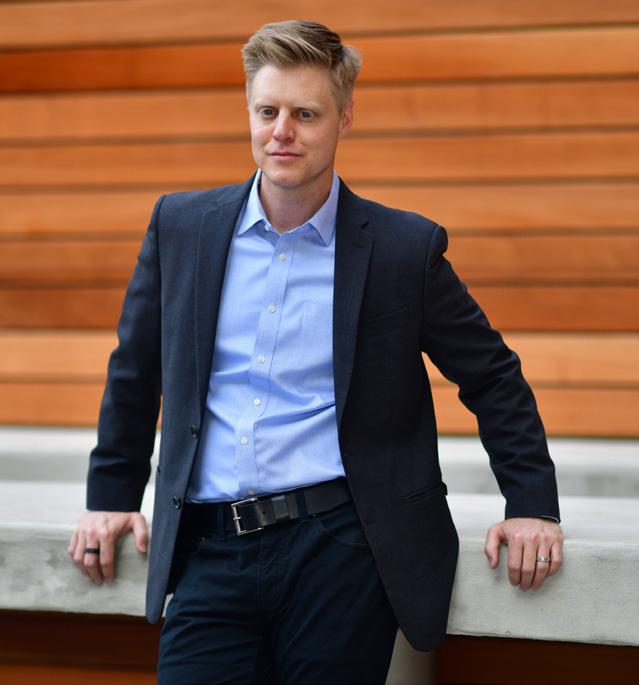
then want to connect another bank account at a different bank, we can verify their ownership in real time.”
This has taken on renewed significance in the past year. Multiple disparate sanctions lists mean that companies need to know who their customers are more than ever; coupled with a crackdown in the US on money laundering, compliance is a key consideration for fintechs and banks alike.
Putting consumer power back in consumer hands
Despite the optimism around open finance, it’s clear there still need to be checks and balances on what can be done with consumer data. It is their data after all, so informed consent is important.
MATT WILCOXTITLE: PRESIDENT OF DIGITAL PAYMENTS
INDUSTRY: IT CONSULTING
LOCATION: UNITED STATES
As President of Digital Payments at Fiserv, Matt Wilcox is responsible for turnkey services for a multitude of Fiserv product lines while also focusing on creating high-growth digital experiences in the real-time payment solutions marketplace. Wilcox oversees collaboration opportunities within the financial services industry, helping to build digital and payment strategies and product innovations that drive revenue, client retention and new client acquisition. During his career, Matt has directed work in emerging technologies, mobile and online banking, payments, social media and marketing strategies.
@matthewwilcox
MATT WILCOX PRESIDENT OF DIGITAL PAYMENTS, FISERV
“WE’VE BEEN BUILDING AND NURTURING OUR DATA AGGREGATION PLATFORM, CALLED ALLDATA, FOR ABOUT 15 YEARS”
According to the Pew Research Center, nearly 80% of Americans are concerned by how their personal data is being used online – and a similar percentage report having little to no confidence that companies will admit to mistakes and accept responsibility if a data breach occurs. That level of distrust is not exactly conducive to broader adoption of new services among consumers, so taking the right precautions is more vital than ever.
One of the things that Fiserv has built into its AllData platform is an extension called AllData Connect, which allows banks and financial institutions to determine who is able to pull data into, and out of, their ecosystem. Consumers can also decide whether they’re willing to share personal data with a certain fintech or a specific integrator. “That puts the permissioning rights over consumer data in the consumer’s hands,” Wilcox says.
Fiserv will guide that process to ensure the proper checks are done
on the data being loaded into an ecosystem, but its main focus is very much on putting the right technology tools – and subsequently, the power – into consumer’s hands. This entire approach replaces the screen scraping model, which can be challenging to maintain.
Sunil Sachdev believes that we can look forward to a bright future in fintech, thanks in part to the power of open finance. Perhaps surprisingly, he likens it to the galactic empire: “If I were to hypothesise on the future of open finance, I’d point to Star Wars and other futuristic movies, where payments and exchanges of value leverage some form of universal currency. I think that’s what’s promising about embedded finance and modern finance more holistically: we’re able to embed payments and other digital assets into user experiences so transactions become much more
seamless, and the fungibility of the underlying assets neededto enable a universal currency increases.
“Ultimately, it represents the ability for all of us to be on the same tender type, so to speak. Given the current direction of digital identity and real-time payments around the world, it’s hard not to see that we are moving quickly towards a universal payment vehicle that accounts for identity and value exchanged at the time of the transaction. It’s a future where you don’t have to worry about geographical or regulatory limitations for whatever product or service you’relooking to access.”
In terms of data ownership specifically, Matt Wilcox continues: “We’re headed towards an environment where data is going to move more freely, but in a really sound and safe way. There will be more of a governing body around the movement of data – similar to what we’ve seen in other regions.
“Direct connections and direct access to data will open up innovation, because, despite the progress we have made in open finance around pulling in all of the financial data on behalf of a consumer or a business, we still have a way to go.
“I still think that the pace of innovation can increase exponentially, and I still think that there are too many entry points for access to the consumer’s data. On behalf of the consumer, I’d like to see open finance really streamline that so we can put the consumer in a decision-making role on how their data can be used and shared. We’ve seen that, when we give them that ability, they’re not necessarily restricted but they’re exposed to the benefits of that personalised experience.” fiserv.com





As the fintech industry continues to thrive globally, breaking new boundaries and introducing more innovations to the marketplace, women are taking an increasingly central role at the helm of disruptive fintech companies. Whether they are C-level decision makers in established global corporations or dynamic startup founders, their contributions to the changes in fintech – and the way in which products and services now better serve 50% of the world’s population – are undeniable.
We list the top 10 women to watch in 2023 and the companies they steer that are propelling change.

Vrinda Gupta is the innovative Founder and CEO of Sequin Financial – a fintech company aimed specifically at boosting credit ratings for women. She launched the company after developing a card for Visa and then being turned down for the product.
Gupta was recently named one of NYC’s 55 Most Inspiring Women in Fintech, which was celebrated at the New York Stock exchange. Of the moment, she said: “This is an especially meaningful honour, as the New York Stock Exchange took 175 years to seat its first woman – Muriel Siebert. I’m inspired by women’s progress and accomplishments, as inspirational leaders and innovators in an industry that was designed to leave women out of the narrative.”
Manuela Seve is the Co-founder and CEO of the US-based startup Alphaa.io and was recently named one of the top 100 influential Latinos/Latinas by Bloomberg.

An Economics graduate from IBMEC, Seve spent five years working with the former President of the Central Bank of Brazil, Armínio Fraga, at Gávea Investimentos.
In 2015, she began examining the use of blockchain for authenticating art collectibles and, in 2017, developed the Alphaa.io API – a blockchain platform that addresses three problems in the space, namely authenticity, resale, and community-building in various sectors.

Ghinwa Baradhi is considered one of the top CIO banking leaders globally. An innovative and dynamic executive who excels in leading multidisciplined international virtual resource teams across both business and IT, she is HSBC’s nominated member of the UAE Banks Federation (UBF) IT Committee.
Baradhi is also HSBC’s nominated Sponsor for Diversity & Inclusion for Technology, globally. She is on the Technical Advisory Board of Nodes Agency, a leading digital product development enterprise, and is also an Advisory Board Member for the Money 20/20 Asia RiseUp Program, a global accelerator programme focusing on gender diversity and supporting women across financial services.

With over 25 years of experience in financial services, bank operations, and management consulting at Visa, Charlotte Hogg is a respected figure in the financial industry.
She served as a Chief Operating Officer for the Bank of England from 2013 to 2017 and, before that, led retail distribution for Santander in the UK. Prior to these, Hogg was the Managing Director of Experian’s UK and Ireland operations.
Earlier in her career, Hogg was also the CEO of Goldfish Bank at Discover Financial Services, a Managing Director for strategy and planning at Morgan Stanley, and a Management Consultant at McKinsey & Company, based in the US.
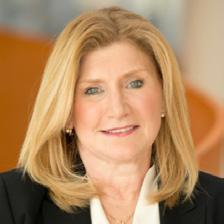

Mariquit Corcoran has 20 years of experience in leading business teams in areas spanning fixed income, operations, risk management, finance, and banking.
Before Barclays, she led the team responsible for sourcing and closing deals for all strategic engagements of a newly launched fintech, Marcus by Goldman Sachs. Now, Mariquit serves on the Strategic Advisory Board for FTV Capital.

Corcoran was recognised in the HERoes Top 100 Women Executives in 2021, 2020, and 2019 by INvolve and Yahoo Finance; NYC FinTech Women’s Inspiring Females of 2019; and, most recently, named in the 2021 FinTech Magazine/IBM’s Top 100 Women in FinTech.
In her spare time, Corcoran is a keen runner, dancer, tennis player, and endurance racer.
JoAnn Stonier – formerly Head of Business Intelligence at Emirates Bank in the UAE – has spent two decades climbing through the ranks at HSBC.
A global data expert with substantial experience creating data strategy and management programs, Stonier ensures data innovation while navigating data risks. She’s a leading expert in data ethics and responsible data practices, with a focus on machine learning and AI. Her skills include expertise in anonymisation and analytics, and she is Adjunct Professor at both Graduate and Undergraduate level.
Mariquit Corcoran Group Chief Innovation Officer Barclays Charlotte Hogg Chief Executive Officer, EU Visa JoAnn Stonier Chief Data Officer MastercardWelsh entrepreneur Anne Boden MBE is a veteran of the financial industry. Prior to launching Starling Bank in 2014, Boden enjoyed a 30-year career holding leading positions at Allied Irish Banks, Royal Bank of Scotland, and ABN AMRO.

A qualified computer scientist, she was an early advocate for the use of technology in the financial industry and launched Starling Bank in 2014. Her strategy from the outset involved making the bank a global brand.
As the CEO, she oversees the Executive Leadership Team and is a member of Starling’s Board of Directors. Boden was awarded an MBE for her services to the financial and technology industry in 2018.
The climb to success hasn’t always been easy for Samantha Ku. After graduating from the University of Miami as a 21-year-old in the middle of an economic recession, she was deeply in debt and found the employment market unforgiving. She recalls that it was “a perfect storm of emotion to end the greatest college experience anyone could have”.
But, despite a period of turmoil that came after attending 50 job interviews seemingly without any success, Citibank offered Ku her first position in the financial industry in 2010.
She later joined Square in 2015 as Head of Operations, rising through the ranks to her current position of COO. Ku then built and led several teams foundational to the Square Capital program product suite, expanding the team to 100+ employees across San Francisco, New York, Las Vegas, and Melbourne in Australia.
 Anne Boden
Samantha Ku COO
Anne Boden
Samantha Ku COO
Emilie Choi joined Coinbase in early 2018 as the vice president of business and data before moving up the ranks to become President and Chief Operating Officer. She helped build the exchange alongside founder and CEO, Brian Armstrong.

Choi is also a keen angel investor and has taken part in several seed, Series A, and Series B funding rounds for a number of successful fintechs.
Prior to joining Coinbase, Choi held senior executive roles at Warner Bros, Yahoo and Naspers. While serving as LinkedIn’s Vice President of Corporate Development, Choi oversaw more than 40 transactions – including the acquisitions of Lynda, Bright, Newsle, Connectifier, Slideshare, and Fliptop, as well as LinkedIn’s JV in China and strategic investments in Cornerstone On Demand and G2 Crowd.
The dynamic leader has helped steer the company through four crypto winters and Coinbase’s recent round of redundancies. In relation to the fluctuations in cryptocurrency, though, the leadership team is looking beyond the current economic cycle and says that, despite the recent downturn, the company continues to be strong.
Speaking at Coinbase’s public listing in 2021, when the company was valued at US$86bn, Choi told reporters: “I want everybody to be in this for the long term. Crypto, as you know, has cycles. I want us to think about things much in the way Amazon did. Nothing matters right now day to day.”
Coinbase’s latest valuation is US$14bn.
In August 2022, she was appointed to the board of directors for independent identity provider Okta.
Choi holds a BA in Economics from the Johns Hopkins University and an M.B.A from the Wharton School at the University of Pennsylvania.
“I WANT EVERYBODY TO BE IN THIS FOR THE LONG TERM. CRYPTO, AS YOU KNOW, HAS CYCLES. I WANT US TO THINK ABOUT THINGS MUCH IN THE WAY AMAZON DID. NOTHING MATTERS RIGHT NOW DAY TO DAY”
Financial innovator and fintech founder Cristina Junqueira has smashed the glass ceiling in the fiercely male-orientated environment of the Brazilian financial industry, with her contributions having helped launch a new wave of digital banking and finance in the region.
Prior to the launch of Nubank – a collaborative effort between Junqueira and her two co-founders, David Vélez and Edward Wible – bank customers in Brazil had little choice but to fall in with the demands of the incumbent banks, all of which charged high fees for every service. Such exorbitant expenses drained precious resources from hardworking families, thus maintaining, rather than aiding, the financial inclusion gap.
A mother of two and qualified engineer, Junqueira helped launch Nubank in 2013. Her passion to drive change in the Brazilian banking world has, in turn, been realised, serving an estimated 75 million customers.
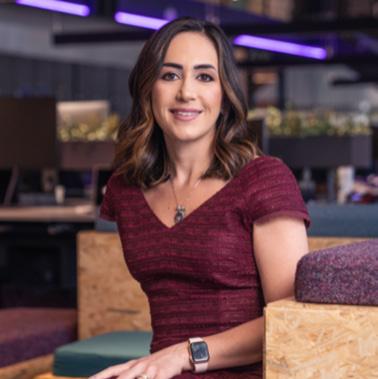
Success has seen Junqueira become only the second self-made female billionaire from Brazil – her 2.9% stake in Nubank gives her a personal fortune of around US$1.3 billion.
According to its IPO prospectus, Nubank’s total market potential was valued at US$99bn in 2020, and it has been predicted to grow to US$126bn by 2025.
Still under 40 years of age, Junqueira is not averse to referencing Star Wars, even though she was born 7 years after its 1977 release.
“If banks are Darth Vader, credit cards are the Death Star. They’re the horrible weapon the banks used,” she said.
“IF BANKS ARE DARTH VADER, CREDIT CARDS ARE THE DEATH STAR. THEY’RE THE HORRIBLE WEAPON THE BANKS USED”
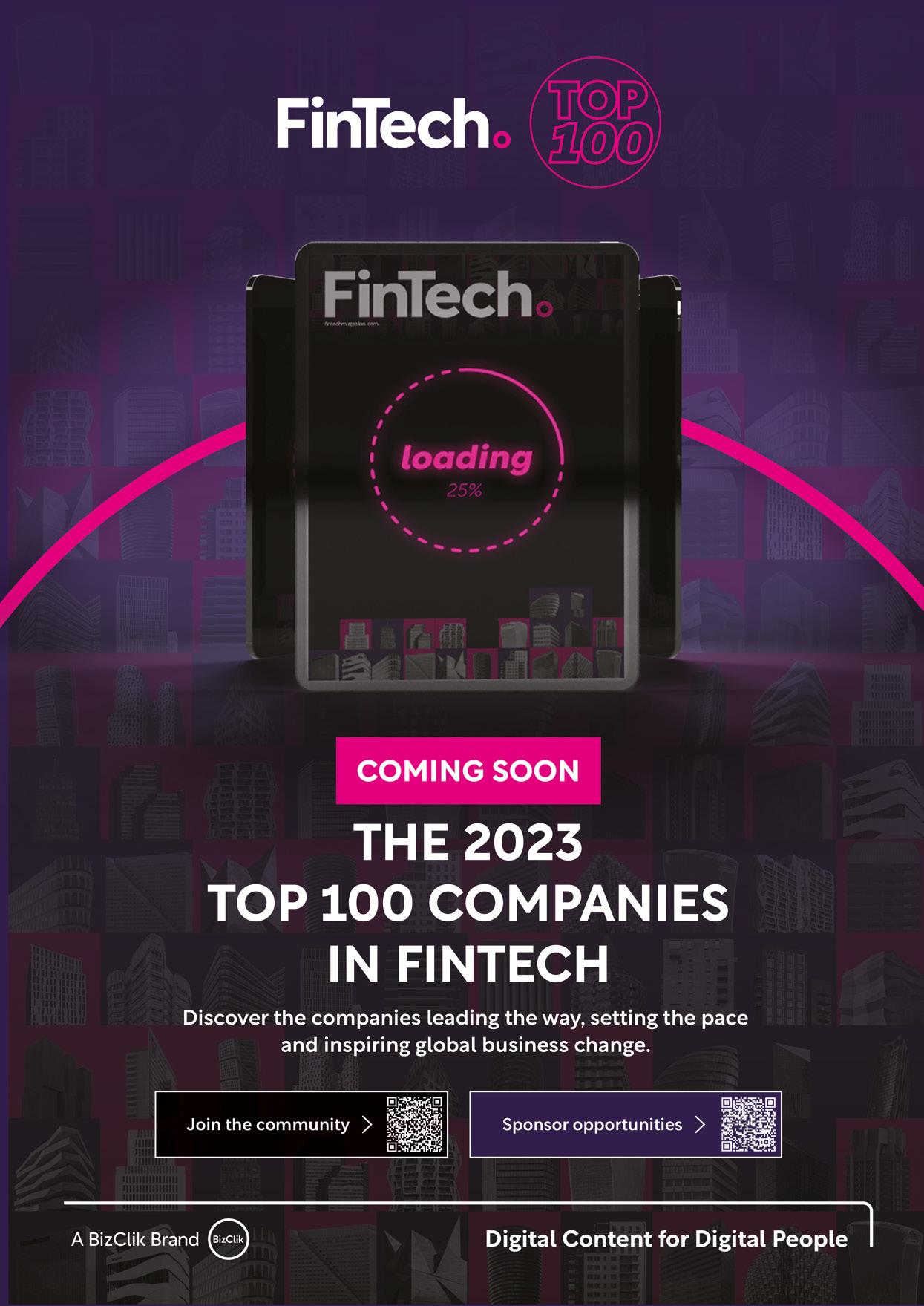
Swan, who studied as an engineer specialising in mechatronics – a multidisciplinary field that exists at the intersection of mechanical, electrical and computer engineering – got swept into the financial world through his early career experiences in startup companies. The path led him into venture capital and later to a company called Solium Capital, which was then acquired by Morgan Stanley in 2019.
The route to IPO is a complicated one – especially given the current climate, as the economy slows and companies are under increasing pressure to scale while maintaining more modest financial constraints than they were previously afforded.
When a private company seeks to go public, it usually means one of three things: firstly, a company is seeking to raise capital; secondly, its board is planning to provide liquidity for investors and employees; and, finally, there’s a desire to raise brand awareness and strengthen market position in the eyes of potential customers. The route to an IPO has often been seen as a key milestone in a company’s development in the global marketplace.
But in recent years – helped along by some regulatory changes and market factors – many companies are choosing to delay their route to the public markets and instead work on accessing capital through venture capital and growth equity investors to maintain their private company status.
According to Kevin Swan, Co-Head of Global Private Markets for Morgan Stanley at Work, these days the average time for a startup company, from launch to making the move to go public, is now over 12 years.
Swan’s background has been instrumental in his understanding of the various reasons underscoring certain companies’ decision to choose an IPO route or remain as private entities. The delay in going public, he explains, is mainly due to changes in the regulatory environment in addition to the flow of capital from public to private markets. This has resulted in private companies being able to raise significant capital without having to go public.
“Over the past decade, we’ve seen increasing amounts of capital flow into the private markets, and we’ve encountered several other factors that have led to this dynamic situation, where companies are now staying private for much, much longer. Now, the average time to enter the public market for a venturebacked tech startup is much longer and these companies are valued in the billions, many in the tens of billions. Furthermore, some are able to raise enough private capital to not even necessarily need to pursue an IPO and rather enter the public markets through a direct listing.”
Even though it may take a company several years to reach the point where pursuing the public markets is a possibility, preparing for that process requires careful planning. Alternatively, while a company may wish to remain private, it may need to address its equity structure and liquidity strategy to ensure it remains an attractive option for its investors and employees as well as navigate the current economic climate.
Morgan Stanley at Work is helping to create a new roadmap for private and public companies seeking to generate liquidity

Although IPOs are generally considered the ultimate liquidity event, private capital markets are continuing to gain momentum in terms of investment interest. As a result, many companies are able to generate the funds required to provide employees with some liquidity on their equity packages, without going public.
These types of events, however – and the management of successful equity programmes –require considerable groundwork to be viable.
And that’s where Morgan Stanley at Work comes in: a division of Morgan Stanley that is focused entirely on private and public company share plan administration solutions that empower companies in providing employees workplace financial benefits. Their offering covers equity management, retirement solutions and financial wellness. For private companies wanting to maximise the benefit of their equity programmes, Morgan Stanley at Work offers a number of liquidity solutions.
Morgan Stanley’s day-to-day operations primarily consist of investment banking and financial services, so offering solutions that aid in the path to the public markets beyond raising capital has been a natural progression. As a global corporation, it is uniquely positioned to provide an equity management system for the private market that can facilitate recordkeeping, transactions, and money movement.
“If you’re a public company, that infrastructure already exists in the form of transfer agents and
clearing brokers, where you can easily buy and sell stocks in a public company online or through your financial advisor,” Swan says.

However, in the private marketplace, this can be more of a challenge, as historically speaking, there’s never been a highly sophisticated infrastructure to provide easy liquidity solutions. Morgan Stanley at Work is taking a progressive approach to solving that challenge by building a trading infrastructure and transaction execution framework that caters to private markets and is designed with an issuer perspective.
Unsurprisingly, the private markets don’t operate in the same way as public markets. Regulation is quite different, and the private investor community often has different objectives and time horizons than public investors. Morgan Stanley at Work offers Shareworks – an equity management platform utilised by private companies to manage their cap tables, employee stock plan and liquidity programmes. They have also launched a private market transaction desk that can help execute block sales and other forms of secondary transactions, giving shareholders access to liquidity and clients access to investment opportunities.
KEVIN SWAN CO-HEAD OF GLOBAL PRIVATE MARKETS, MORGAN STANLEY AT WORK
“Historically speaking, there’s never been a highly sophisticated infrastructure to provide easy liquidity solutions in the private marketplace and Morgan Stanley at Work is taking a progressive approach to solving that challenge”
“We have the equity management platform and transactional capabilities to be able to support companies and shareholders,” Swan explains. “We also have an attractive investor client base for participation in liquidity events and secondary transactions.”
According to Swan, high-growth venture-backed companies control their cap tables, as ownership structures and the different legalities provide them the authority to decide who can be an investor –and who can’t.
“The big takeaway is that these companies have a definitive say in terms of who can actually own their shares. So they want high-quality, reputable, long term investors on their cap table.”
Morgan Stanley at Work is fortunate to work with some of the best companies in the world, due to the full suite of wealth management and financial wellness offerings. These services empower companies to extend benefits to their employees, at the same time as engaging directly with both employees and investors.

“A lot of times, for employees in these startups, it’s the first time that they’ve obtained any wealth. And whether that’s a modest amount or generational wealth– which isn’t uncommon at some of these
INDUSTRY: FINANCIAL SERVICES
LOCATION: ALBERTA, CANADA
Kevin Swan is a Managing Director of Morgan Stanley in Wealth Management. He is Co-Head of Global Private Markets for Morgan Stanley At Work, which delivers equity management, liquidity, and workplace solutions to private companies. He joined Morgan Stanley through the acquisition of Solium Capital where he served as the VP of Corporate Development. Prior to joining Morgan Stanley, Kevin held roles in product management and corporate development, was a Partner at venture capital firm Inovia Capital, and served as a board member at several venture backed technology startups. Kevin has a B.Sc. from the University of Alberta and an M.S. from Stanford University where he studied mechatronics and control systems.
startup companies – we have solutions and a large population of top financial advisors to support these employees on their financial journey.”
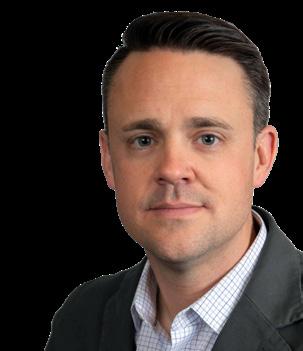
Sam Adams is the Executive Director of Private to Public Strategy for Morgan Stanley at Work. A veteran of the ‘route to IPO’ journey prior to joining Morgan Stanley, she managed a number of prominent IPO projects, which helped her to decide that managing share plan administration programmes and supporting companies through the process was the perfect use of her acquired skills.
“We have several private clients who have no intentions of ever going public and we’re starting to see a larger trend in new clients who want to establish stock plans with regular liquidity activity already preprogrammed in,” explains Adams.
“This is because it gives them the flexibility to allow people to take some of the value that they’ve helped create in the company off the table through the shares they’ve earned as an employee, while not putting so much pressure on the overall company to have to make a decision of whether or not to go public within a certain time period.”
As someone who has witnessed first-hand the complicated process of the path to IPO, Adams is passionate about her role and says companies that manage their equity programmes well not only benefit themselves but in turn, also change the lives of their loyal employees.
“One of my personal missions in life is to make sure that capturing that opportunity doesn’t get lost on other people. It really can be a life-changing thing, and Morgan Stanley at Work can not only help the company have the underlying infrastructure to make those transactions happen, but on the participant side, ensure that people have the right resources to take advantage of what that opportunity brings to the table.”
A good equity programme not only rewards employees but also creates a deeper investment culture within the organisation. If an employee can see the value of their shares rising as the company grows, it can incentivise them to work towards the company’s common goals. Equally, companies today may have to take into account lifestyle choices. Employees might have certain expectations in mind when they consider equity programmes at the joboffer level.

Today, as companies take longer to reach the IPO stage, they also have simultaneous opportunity to scale and grow. This means they have to offer competitive equity stake value or risk losing out to the
competition. The war for talent as we’ve known it for the last 10 years is beginning to slow, evidenced by the volume of layoffs, particularly in the technology sector. However, down markets may breed innovation because with mass layoffs comes a surplus of talented people that find themselves without work, have potentially realised some significant value from previous roles and are ready to solve new problems. Similar to companies that emerged in the aftermath of the 2008 financial crisis, Morgan Stanley at Work believes there will be a new period of innovation out of the current downturn as well.
Swan says: “One of the big drivers in the evolving approach private companies take towards liquidity over the last decade was the war for talent. Private companies have become much larger, but the draw for startups to attract employees was always in the equity. You knew that you were taking a job where you were going to be fairly underpaid from a market perspective in your base salary. However, you’re going to have the upside of equity, which could create an asymmetrical outcome, financially, for yourself.”
But what happens if these companies stay private for longer? “Now, we have companies that are worth billions – even tens of billions of dollars and they’re financially sound – and they’ve raised a tonne of capital. But as valuations increase, you obviously don’t have quite the same upside in any new equity you receive as you did when you were a small startup worth a few million dollars,” Swan says.
He goes on to explain that a shift has occurred, where these companies have to start paying more competitively on base salaries. But they may also have to be competitive on the equity front. And very often in these cases, private companies are competing with large public companies.
“So, if I’m a senior engineer looking at joining one of these late-stage private companies and I’ve got an offer from them and I’ve got an offer from one of the world’s leading public tech companies – they may be very similar in terms of the base salary, and even the value of the equity I’m getting.”
“But one big difference is that in a public company, when your equity vests, you can immediately sell it on the public markets. You have access to a liquid market.”
At a private company, the options are more limited. Swan establishes that this is where Morgan Stanley at Work comes in, following a growing number of private companies that have started becoming more proactive in providing liquidity to compete with public companies. Just over the past three years, it’s a much more commonplace approach for large companies to take.
Current financial instability is another reason for employees to demand greater value and security from their companies, says Adams, highlighting that the need for better equity packages has probably never been greater.

“In terms of what’s happening economically, I think liquidity is even more important because people
SAM ADAMSTITLE: EXECUTIVE DIRECTOR, PRIVATE TO PUBLIC STRATEGY
INDUSTRY: FINANCIAL SERVICES
LOCATION: CALIFORNIA, US
Sam Adams is currently an Executive Director at Morgan Stanley at Work leading a specialised team focused on helping private companies transition their stock plans into the public market.
Prior to this role, Sam led the global equity team at DoorDash through building a best-in-class equity infrastructure to operate as a growing public company and a tremendously successful IPO in 2020. She also led MuleSoft’s global equity team through an IPO in 2017 and subsequent acquisition by Salesforce in 2018. Additionally, she designed MuleSoft’s Total Rewards and Mobility practices, including global compensation programs, ESPP, and employee benefit packages. Sam was also a key member on the Trulia legal team managing all things stock and corporate compliance through their IPO in 2012 and subsequent acquisition by Zillow in 2015. Sam received a BA in Sociology from UCLA in 2004 and the CEP designation in 2015.
 SAM ADAMS
SAM ADAMS
EXECUTIVE DIRECTOR, PRIVATE TO PUBLIC STRATEGY, MORGAN STANLEY AT WORK
“Trust and reputation are a really big deal. Typically, when a company decides to embark on the path to IPO, they may only give themselves three months to manage the entire process”
As the Executive Director of Private to Public Strategy for Morgan Stanley at Work, Sam Adams is passionate about managing IPO and private equity paths for companies
Playing a major role in the IPO and private equity programmes of some of the world’s largest companies was not originally in the career plan for Sam Adams. The Los Angeles native initially had ambitions to enter the interior design industry, as her family owned a textile cleaning and restoration business. “I felt it was part of my DNA,” she says.
But fate had other plans. After a post-college move to San Francisco, following the 2008 financial crash, Adams ended up working for a small start-up company that inadvertently put her on the path of being an equity owner and guiding companies and employees through large liquidity events.
From there, Adams moved to another start-up company, which involved her in the IPO process, and gave her the opportunity to be mentored. This led to further roles at MuleSoft and DoorDash – always operating in-house equity functions with a penchant for the private to public transition process.
She joined Morgan Stanley at Work because it offers her the opportunity to employ her skills and knowledge without having to move on from companies once the IPO process has been completed.
“I’m a single mom and I’ve had to learn all these things on my own, and I take it really personally that, through my work, I can help other people who are probably in the exact same position that I was in 10 years ago.”
She adds: “It’s great to be able to recognise the value potential in a growing company. It’s also important to have a high amount of responsibility and gratitude for those things, too.”
“That really gets me up in the morning because I know that the work we do ends up creating an experience for an end user that we probably never talk to.”
don’t have access to as much capital. Credit is far more expensive; inflation means that your money doesn’t go nearly as far as it did a couple of years ago.”
“But people still have real needs to manage their lifestyles, and that can look like buying a home or paying for education for children. Your day-to-day life in this environment now means that it’s harder to meet those same financial obligations. And so, if you have equity and you have all this value sitting on the sidelines, people want access to it. They need access to it now probably more than they have in the last 5 to 10 years.”
Questions, however, remain. How do private companies fit into all this, particularly at a time when investment activity is low? And how can they generate enough capital to remain as competitive as their public counterparts? Adams says it all comes down to arranging the right types of liquidity events and setting up a strong framework.
“As an employee, you’ve been helping generate value over the period that you’ve been employed, and you’ve seen prices go up. Now, we’re starting to see company valuations level out or go back down. But investors still believe in these businesses. Some of the economic factors at play here are not necessarily because these businesses aren’t good businesses worth investing in.”
She points out that the tough climate doesn’t mean investing opportunities won’t happen; rather, in some ways, the opportunities are greater. “It’s an interesting opportunity for investors who have probably been sitting on the side lines when valuations were higher and saying, ‘That price point feels too high for me to start to get involved’, and take positions in companies that they truly believe in at a price that seems a little bit more reasonable and sound, and start to be able to play the long game.”
SAM ADAMS EXECUTIVE DIRECTOR, PRIVATE TO PUBLIC STRATEGY, MORGAN STANLEY AT WORK
“IPOs can be messy and disorganised, because there are just so many bases that need to be covered”
Not going public but enabling employees to gain value from their stocks can result in gains all around, without the demands of going public. For example, if a group of two or three investors is looking to take a position and a group of 100 employees is ready to sell to them, it reduces the number of shareholders on the company’s cap table.

“This can potentially be really beneficial to all parties,” Adams states.
She points out that the benefit of gaining liquidity works on two levels for companies. Firstly, by letting them sell directly to an investor, they are allowing liquidity for employees without dilution. The process also provides an opportunity to clean up the cap table, the records of stock ownership, and reduce the number of actual shareholders.
One downside, however, is that the process may force companies and individual shareholders to come to terms with the delta in current valuations versus where they were a year ago. The gap in valuations from a company’s last fundraising round and what investors are willing to pay today is widening in private secondary markets.
“Something that we think our clients are still coming to terms with is taking the hit on price now and knowing that, if this is a good business, it will outlast the market conditions that exist today,” she says.
From a venture capitalist perspective, the situation can be complicated. They want to maximise the valuations in their existing portfolio companies while entering new ones at what they deem as fair valuations. VCs carry out their own valuation models on what future valuations of certain companies will look like, generally built on revenue multiples, growth rates and unit economics. But, there is also an element of volatility in share prices, depending on competitive dynamics and the market’s climate.
Added to that is the current, ongoing economic downturn – though this will almost certainly selfcorrect at some point, with Swan explaining that “the venture capital market is very cyclical”.
“Even compared to other financial markets, it has the highest highs and the lowest lows when it comes to valuations. For example, just over a year ago, secondary investors would pay a premium on the last round that a company raised.
“Now, we’re in a different macro environment and talking about the discounts on the round an investor would pay. What’s interesting or unique is that it’s been so long since we’ve had one of these downturns. The market has been relatively stable for a decade. So there’s a whole generation of people operating in this market that have never experienced a recession. Also, 10 years ago, we didn’t have these massive
private companies, liquid secondary markets, and large amounts of private capital available; it’s uncharted territory for everyone. But, like any market, it’ll figure itself out in the long-term.”
Due to Morgan Stanley at Work offering a unique service via the provision of a clear and managed path through both IPO offerings and private liquidity services, the future’s looking bright. Adams explains that, very often, these processes are messy and rushed. But when a dedicated team can guide a company through the regulatory and transactional minefield, it can be an invaluable service. Furthermore, many companies are now turning to the service because they want to be ready and prepared in the event of an IPO. Equally, though, they would like the support of an expert team when it comes to managing their private equity programmes, too.
“If you’re a corporate company and you’re issuing equity to raise money or leveraging stock as part of your compensation programme then it’s really important to continually connect the dots between your investor community, your board of directors, and your employee base,” she says.
Adams stresses the importance of understanding the needs of different groups and elements that are going to propel the business and provide liquidity for people while still potentially scaling to be a public company, “whether or not that ends up being the final result. Sometimes it’s M&A; sometimes it’s staying
KEVIN SWAN CO-HEAD OF GLOBAL PRIVATE MARKETS, MORGANprivate; and sometimes it’s going through an IPO process,” Adams outlines. “For us, I think the next 12 to 18 months are really focused on making all of that easier for corporate clients. If it’s easier for them, then it should be a better experience for their investors and their employees. And working with a brand like Morgan Stanley at Work for such heavyweight decisions also has its merits.”
“Trust and reputation are a really big deal. Typically, when a company decides to embark on the path to IPO, they may only give themselves three months to manage the entire process. It can be messy and disorganised, because there are just so many bases that need to be covered. And then, once they reach the IPO, all that must be managed on the other side of the event, too. It’s not a process that suddenly ends when the company is public.” In relation to this point, Adams notes that companies thinking about their route to IPO may begin preparations a good 12-months in advance to give themselves time to organise everything. She also says that many companies are using Morgan Stanley at Work to get their financial ducks in a row, so that if they do make a last-minute decision to go public, they can do so at short notice and be in their best shape.
“It alleviates a bunch of the pressures that companies start to feel as they approach a large liquidity transaction, like a tender offer or IPO, because they have trusted partners within the Morgan Stanley at Work umbrella. You can help give people resources to make good smart decisions.”
morganstanley.com/atwork linkedin.com/showcase/morgan-stanley-at-work

STANLEY AT WORK
“We’ve seen increasing amounts of capital flow into the private markets… companies are now staying private much longer”
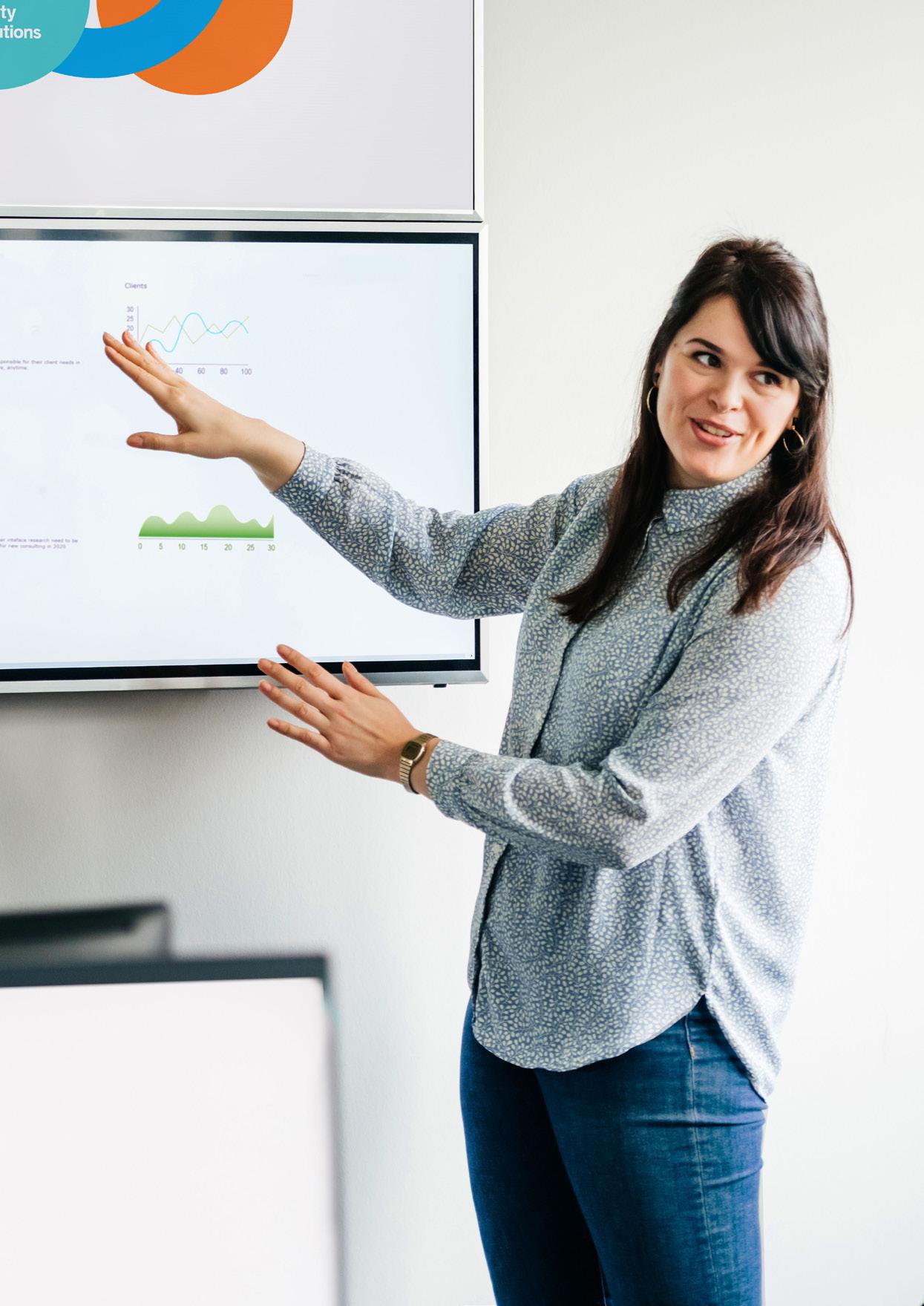 Sam Adams and Kevin Swan of Morgan Stanley at Work on IPO preparedness
Sam Adams and Kevin Swan of Morgan Stanley at Work on IPO preparedness

THE EVENT DISRUPTING FINTECH, INSURTECH & CRYPTO
8-9 NOVEMBER 2023


QEII CENTRE, LONDON


Our two-day in-person events attract acclaimed keynote speakers, interactive workshops, and meaningful discussions on the future of finance.
With more than 3,100 attendees, FinTech LIVE London is the place to meet your peers and be part of the solution. As well as our in-person attendees, you can also join online and watch the sessions live via our event app. Nothing beats being there in person, but virtual is the next best thing.


Last year, we took over the contemporary magazine London venue on the banks of the River Thames looking over the iconic Canary Wharf skyline.
Topics discussed in keynotes, roundtables and fireside chats included:

• Open Banking
• Financial Digitisation
• Future of Fintech
• Insurtech & Customer Centricity
• Women in Fintech
• Investment in Crypto
• Insurtech & Climate Change
• Insurtech: Data & AI
For 2023, we are coming back bigger and better, with a central London venue in the heart of Westminster.
Being held on 8-9 November 2023 at the QEII Centre, this is the perfect opportunity for
AS WELL AS FINTECH PROVIDING DAILY NEWS AND FEATURES AND OUR MONTHLY DIGITAL MAGAZINE, SINCE 2021, WE HAVE ALSO BROUGHT THE INDUSTRY TOGETHER AT FINTECH LIVE
knowledge and networking, with a multi-track conference programme, engaging exhibition space, and bustling breakout areas.

Confirmed speakers include top executives from ABN AMRO, HSBC, Starling, Zonda, Admiral, and UniCredit.
Register to attend, keep up-to-date with the latest speaker announcements,
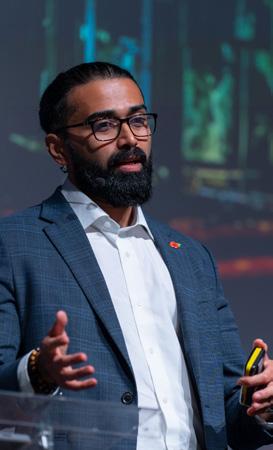

and check out sponsorship opportunities by visiting live.fintechmagazine.com

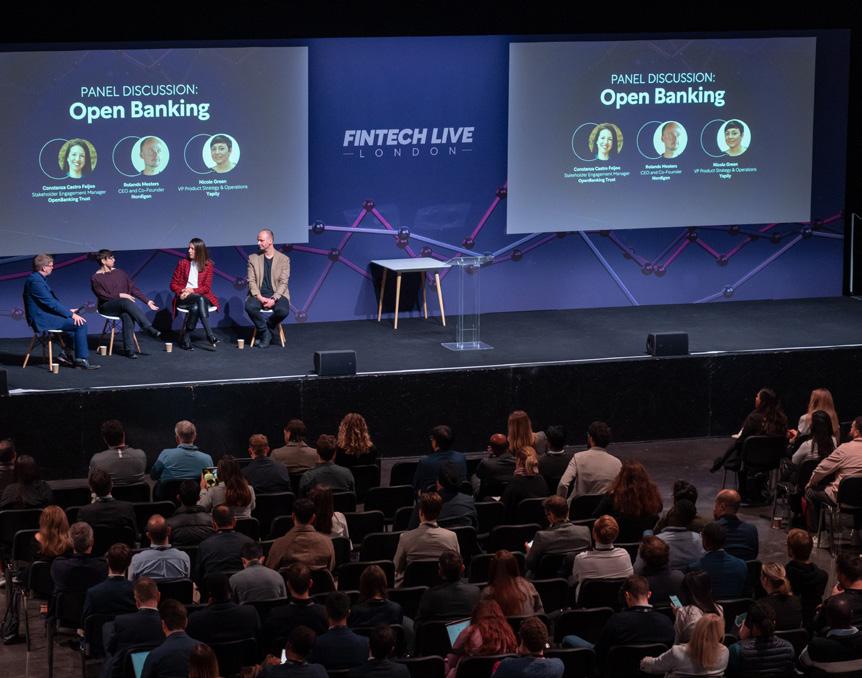
See you at the show!
GET YOUR FREE PASS
“I THOUGHT THE SPEAKERS AND TOPICS WERE GREAT! THE EVENT WAS VERY WELL ORGANISED AND I ENJOYED IT THOROUGHLY”
In 2024 we'll be celebrating the very best in Fintech with the following categories:
• Digital Banking Award
• PayTech Award
• Digital Currency Award
• FinTech Award
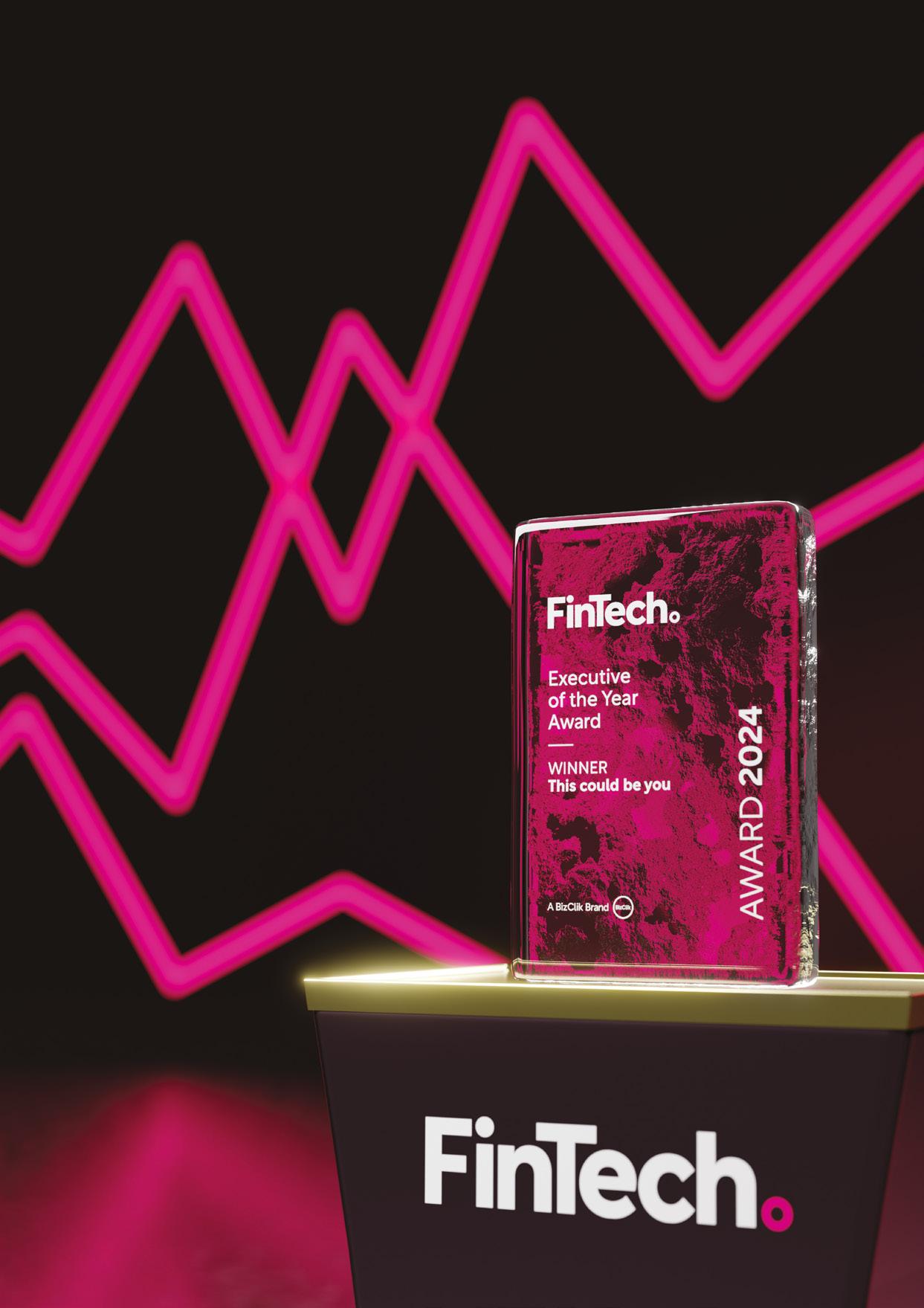
• InsurTech Award
• Sustainable FinTech Award
• FinTech Technology Award
• FinTech Consultancy Award

• Future Leader Award
• Executive of the Year Award
• Project of the Year Award
• Lifetime Achievement Award
We'll be announcing how you can nominate and get involved soon.
Register for FINTECH LIVE and receive all the news and updates so you don't miss this very special night.
One of these could be yours!

 WRITTEN BY: ALEX CLERE
PRODUCED BY: LEWIS VAUGHAN
WRITTEN BY: ALEX CLERE
PRODUCED BY: LEWIS VAUGHAN
When we first talk to Fidelity International, it’s one of the coldest days of the year so far in Europe, with temperatures in some parts dropping as low as -10°C. It’s representative of the mood that has swept over the crypto industry in the past year, undergoing a winter of its own. In part that has been affected by unfavourable economic conditions, price volatility, and the collapse of crypto exchange FTX and crypto lender Genesis. Retaining investor confidence in crypto, then, could be seen as an unenviable task. For Luc Froehlich, Global Head of Digital Asset Solutions at Fidelity International, it was a challenge he wanted to take on, being an early adopter of crypto.
Froehlich, who talks to me from his office in Hong Kong, started investing in bitcoin back in 2015 – the early days, so to speak, for a sector that has moved with pace in such a short period of time.
Froehlich has a background as a credit analyst, trader and a fund manager, working for industry heavyweights like
Credit Suisse and Manulife Asset Management. Cryptocurrencies were still an incredibly new frontier at that time. In 2016 and 2017, shortly after Froehlich took a step into crypto investing, a wave of initial coin offerings (ICO) started coming out.
Froehlich says, over the next couple of years, he underwent an “educational journey” –and senior leaders at Fidelity, which he joined in 2016, started becoming more vocal about the potential for cryptocurrency.
He believes that a lot has matured in the space since those halcyon days, sparked by the increasing mainstreaming of cryptocurrencies like bitcoin. In the beginning, crypto was the preserve of geeks and tech nerds – but in the last couple of years, it’s started to attract the attention of those in the traditional finance space.
“You have a space that is more professional, with quite a few people coming from a traditional finance background.
“There is definitely much more of a focus on real-world applications now – how can distributed ledger technology, in particular blockchain, be used to solve day-to-day problems? That makes it a slightly less exotic space but more interesting in the sense that it’s an opportunity to showcase how blockchain is not just a buzzword or a fad.”
The part of Fidelity’s business headed up by Froehlich focuses on digital assets and only started at the beginning of 2022, but it was the culmination of a long journey into decentralised assets. Not only was Fidelity seeking to enter the digital assets space, it was striving to future-proof its business by preparing for tokenised securities and central bank digital currencies (CBDCs) too. One way it did this was by examining the tokenisation of
“YOU HAVE A SPACE THAT IS MORE PROFESSIONAL, WITH QUITE A FEW PEOPLE COMING FROM A TRADITIONAL FINANCE BACKGROUND”
LUC FROEHLICH GLOBAL HEAD OF DIGITAL ASSET SOLUTIONS, FIDELITY INTERNATIONAL
some of the fund share classes it offered, and identifying where there was demand in the market, Froehlich says: “If you think of digital-native investors, which are naturally more adept to digital assets, they are also looking at ways of integrating traditional assets into their portfolio or wallet. Tokenising this asset necessitates a change, an upgrade in our infrastructure, which is another area that I’m focusing on. So it’s both this convergence from client demand and need for an upgraded infrastructure that led to the decision to dedicate resources to this topic.”
The fact that Fidelity’s customers were asking them to invest in this space was one of the primary motivating factors. Froehlich believes that it would not be possible to test out this emerging area without the backing of key stakeholders within Fidelity, as well as a desire to meet customer demand.
“I think we have a philosophy of pushing the boundaries and using new technologies,” he tells us. “There is a very
Use more image captions as often as possible
entrepreneurial spirit that runs within Fidelity. Most employees have an opportunity to test certain assumptions and hypotheses, to potentially launch new solutions, new services or new lines of business.”

“It doesn’t have to come from the top; there are a lot of people within the company that are given the flexibility of testing a new concept. That’s also one of the reasons that we managed to launch a standalone business dedicated to digital assets.”
Fidelity’s first digital assets product launch was not just a case of a new asset class, it was a case of a new technology that clients had to become accustomed to. Questions around custody pervaded at that time, as they do today, and there was uncertainty about the regulatory wrapper that would surround a launch of this nature.
This was in spite of the loud noise that reverberated around the crypto space. These were crucial concerns, such was the breakneck acceleration of digital assets. “Because there was so much uncertainty about the
technology and a few of the environmental impacts, as well as the valuation… the question was whether it was appropriate for us to launch a product like this for our clients,” Froehlich explains. “We came to the conclusion that, because the client demand was there, our role was not necessarily to dictate what to do but to offer investors a convenient and secure way to access this asset class. So the way this product was positioned was as an access product. If you are interested and if you think that you are knowledgeable on the topic, we will provide you access. That also meant that the focus has been very much on institutional investors, and not on retail investors.”
As part of their digital asset growth, Fidelity International has been partnering with Keith Bear, Associate Partner at Elixirr and a member of the Bank of England Central Bank Digital Currency
LUC FROEHLICH GLOBAL HEAD OF DIGITAL ASSET SOLUTIONS, FIDELITY INTERNATIONAL
“THE LEVEL OF EDUCATION AMONG RETAIL INVESTORS IS STILL LIMITED. PEOPLE HAVE HAD AN EXTREMELY SHORT AMOUNT OF TIME TO DIGEST THE CONCEPT OF DIGITAL ASSETS”
Technology Forum and ESMA’s Consultative Working Group for financial innovation.
“Within digital assets, whilst we may be in a ‘crypto winter’ at present, institutional interest in digital assets remains high, especially with recent gains in prices of bitcoin (up 20% in recent weeks) and Ether,” Bear says. “Failures of centralised entities like FTX have prompted a ‘flight to quality’, which has benefited firms like Fidelity International. The increased focus on crypto by regulators around the world is leading to greater confidence in the asset class by institutions, and the innovation and low costs seen in DeFi protocols is prompting a wave of innovative proofs of capacity (PoCs) and pilots by leading banks, regulators and central banks, such as Projects Guardian (MAS, JP Morgan, SBI), Mariana (BIS, SNB, MAS and Bank of France) and SocGen Forge’s recent US$7m loan from the Maker Dao DeFi protocol.”
TITLE: GLOBAL HEAD OF DIGITAL ASSET SOLUTIONS
COMPANY: FIDELITY INTERNATIONAL
INDUSTRY: FINANCIAL SERVICES
LOCATION: HONG KONG SAR
Luc is the Global Head of Digital Assets at Fidelity International, where he spearheads the firm’s digital assets and cryptocurrencies strategy and engages with institutional investors.
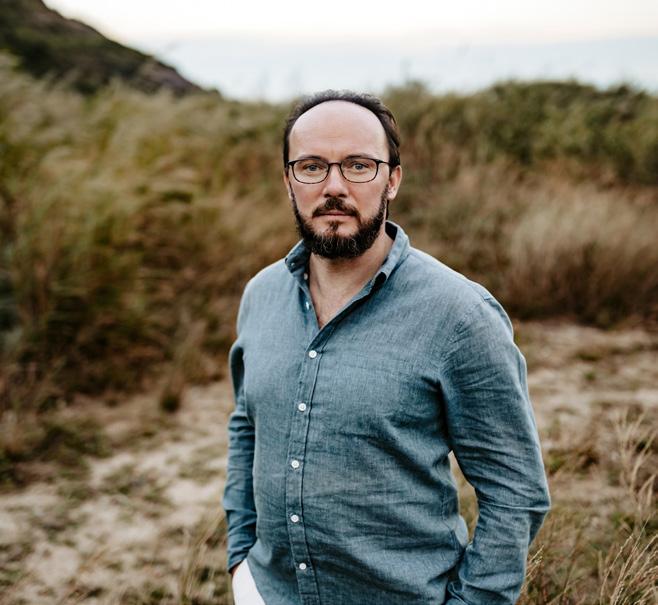
Along with his role at Fidelity, Luc has worked with the World Economic Forum on workstreams related to distributed ledger technology, central bank digital currencies and stablecoins. He has also been advising fintech start-ups in the cryptocurrency and tokenisation space, and is a guest lecturer on digital assets at several universities.
Before joining Fidelity, Luc was a portfolio manager, managing money for central banks and pension funds; he was a trader in credit derivatives and started his career as a credit analyst.
2.57m Fidelity’s total number of customers
He holds a Master’s degree in Economics and Business Administration from the University of St. Gallen, Switzerland; is a CFA and CAIA charterholder; and is currently working towards a Master of Science in Blockchain and Digital Currency at the University of Nicosia, Cyprus.
LUC FROEHLICH LUC FROEHLICH GLOBAL HEAD OF DIGITAL ASSET SOLUTIONS, FIDELITY INTERNATIONAL“OUR ROLE IS NOT NECESSARILY TO DICTATE WHAT INVESTORS SHOULD DO BUT TO OFFER THEM A CONVENIENT AND SECURE WAY TO ACCESS THIS ASSET CLASS”
TITLE: ASSOCIATE PARTNER
COMPANY: ELIXIRR
INDUSTRY: MANAGEMENT
Keith is an Associate Partner at Elixirr where he focuses on Digital Asset strategy engagements. He sits on the Bank of England CBDC Technology Forum, ESMA’s Consultative Working Group for Financial Innovation, and mentors at the Techstars Barclays, ABN AMRO and Web3 Accelerators. He also serves as an Advisory Board member for a number of fintechs, as an Independent Director at DFNS, a walletas-a-service infrastructure provider, and on the Technology and Operations Resilience Committee at the London Metal Exchange. Keith is also a Research Fellow at University of Cambridge’s Centre for Alternative Finance, chairing the digital asset research programme that is supported by 15 public and private institutions including Fidelity. Previously, Keith led the Financial Markets industry at IBM.
Fidelity International and Elixirr recently collaborated in researching how many institutional clients are offering crypto and digital asset services to clients, how many have dedicated digital asset units in place, and what the perspectives are for growth of the digital assets industry.
“We are at the early stages of a transformation of financial markets,” states Bear. “Whilst the crypto market may be beginning to show green shoots in its recovery, the bigger opportunity is how the key technologies from crypto (blockchain, tokens, automated market making) will transform traditional financial markets. Tokenisation can bring great investor access to illiquid markets like private equity and real estate, broader investor access through
fractionalisation of assets like art and collectibles, and great efficiencies to post-trade through the instantaneous exchange of tokenised cash and securities through atomic settlement, reducing friction and costs. Some estimates see tokenised markets being a $16tn market (10% of global GDP) by 2030, and the early innovators such as Fidelity are wellpositioned to ride this wave.”
The issue of knowledge and education continues to be one of crypto’s sorest points. On the retail side, research from Cardify suggests that a third of consumers who invest in crypto admit to having little or no understanding of the products they’re buying. Crypto has moved into the mainstream so

$16tn
Estimated market value by 2030
quickly that some consumers haven’t done their research properly before parting with their money – and although the picture is different with institutional investors, it points to broader challenges within the digital asset space. Extreme price volatility and the prevalence of crypto scams leave a lingering sense of unease among retail investors towards crypto –something that the past few months have only exacerbated.
“The level of understanding is still limited,” Froehlich says about retail investors. “Bitcoin was launched in 2009, so some passionate people have had time to explore the concept and make an opinion about that, but most consumers started looking at cryptocurrency around 2020 or 2021 when bitcoin was making all the headlines. In this sense, it has
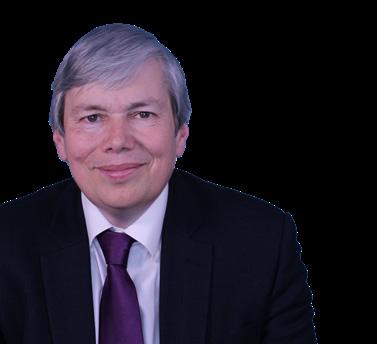
been a relatively short period for people to learn about digital assets. You also need to take a multi-disciplinary approach, from technology to economics, which is time-intensive and
takes a while to digest.”
Like many trends within the industry, the COVID19 pandemic has proved to be a catalyst; some people spent lockdown baking bread, while others got to grips with the mechanics behind cryptocurrencies and the blockchain. But, within the retail market as a whole, there is still progress to be made.
On the institutional side, investors who have already made that decision to include digital assets within their portfolios are generally unflinching – perhaps, as Froehlich alludes to, it is because their crypto holdings represent a fairly low proportion of their overall investments and because they appreciate that, whatever happens with cryptocurrencies, traditional finance and decentralised

finance are converging thanks to the adoption of distributed ledger technology.
“In addition, through the process of experimenting with digital assets, those investors have been gaining an understanding and a comfort level with this asset class,” Froehlich continues. “Interestingly, theses vary, with some investors hypothesising that bitcoin could be, for instance, the future digital gold, or Ethereum could be the next platform on which the majority of financial services are going to be built.”
Despite the robust confidence in digital assets that exists among institutional investors, there are still considerable barriers to adoption. That situation has not
KEITH BEAR ASSOCIATE PARTNER, ELIXIRR
“WITH THE SKILLS AND RESOURCES WE HAVE, WE CAN GO RIGHT FROM UPFRONT CONSULTING ALL THE WAY TO BUILDING AND DEPLOYING IT SOLUTIONS”
been helped by events involving FTX and Genesis.
Froehlich states: “Even before FTX and other collapses, one of the biggest hurdles was regulation. For an institutional investor, especially if you invest on behalf of clients, you need a high degree of certainty that you are operating within an acceptable regulatory framework. That regulatory framework is not clear in most jurisdictions. There’s a lot of challenges in understanding the current statutes, and they are also continuously evolving. But this issue is normal for new technologies, and it is an opportunity for established houses like Fidelity to help share the future of this industry.”

There is also a challenge in getting institutional investors to consider what they could be doing with digital assets. That necessitates a different approach and a different way of thinking from Fidelity. He likens it to the iPhone: when that groundbreaking technology was launched over 15 years ago, people didn’t understand the
full capabilities of what they could do with it, whereas now it seems second-nature to most consumers. Perhaps in 15 years’ time, the same will be said of digital assets.
“There is a bit of a change in the philosophy of how to approach investment solutions in digital assets,” Froehlich continues. “We need to be a little bit more experimental and push for innovation. This is not straightforward for traditional asset managers because it’s a different process to traditional asset classes.”
In the next couple of years, we should expect to see a rebound in the crypto market after a difficult patch – but there will also be a flurry of new applications and use-cases for digital assets, from sustainability to carbon credits and food safety. It will take time for us to identify which trends are worth capitalising on but it will be worth it because there is room for significant improvement and new business models, Froehlich says.
There will also need to be a conversation about how
distributed ledger technology is implemented – whether it’s a way to provide a more convenient and cheaper access to your fund, or whether it’s the start of integrating new types of assets through tokenisation.

“I think it’s a golden era for institutional investors to move into the digital assets space because what this washout has done last year was not just to remove bad actors, but also to recognise that there were a lot of companies that just didn’t know what they were doing or didn’t have the means to cope with hyper-growth. I see the opportunity for established, highly licenced operators like Fidelity to position themselves in this market and help shape it in a way that makes it more suitable for institutional and retail investors.”
fidelity.co.uk
@fidelity-international
@fidelity_uk
@FidelityUK






















 PRODUCED BY: MICHAEL BANYARD
AD FEATURE
PRODUCED BY: MICHAEL BANYARD
AD FEATURE
intech is a challenging arena that innovates at an extraordinary pace, posing difficulties even for those with years of industry experience.
The convergence of the financial world with emerging, transformative technology is rightly shrouded in language that is often difficult to decipher.
That’s one of the great things about speaking with Stephen Roche and Gabino Roche, Jr. – the twin brothers behind fintech juggernaut, Saphyre. They use metaphors and refreshingly plain language, that even a journalist can understand, to explain how forces such as AI are fundamentally changing the global financial system.
Of course, this is also important when explaining the benefits that Saphyre can offer clients
and partners – and they are clearly doing a great job of that as more industry heavyweights join the ‘Saphyre Endeavour’.
“Firms have a concern about being left behind in today’s hypercompetitive financial services landscape,” explains Gabino.
“That's why it’s important that publications like FinTech share the advances that we are making with tools such as AI, and the firms that are adapting this technology, so that we can fully convey the direction that financial services are moving in.”
“There are a lot of technology vendors who pay lip service to solving the pain points that Saphyre’s proprietary platform finally solves.
Stephen and I love to tell our clients, ‘Here are the keys, you can drive the
The finance industry is catching on to Saphyre’s secret sauce and realising the opportunity to gain competitive advantage with AI-powered trading tools
Fintech disruptor Saphyre makes smarter trading simple
 The Roche brothers, Gabino Roche, Jr. and Stephen Roche
The Roche brothers, Gabino Roche, Jr. and Stephen Roche
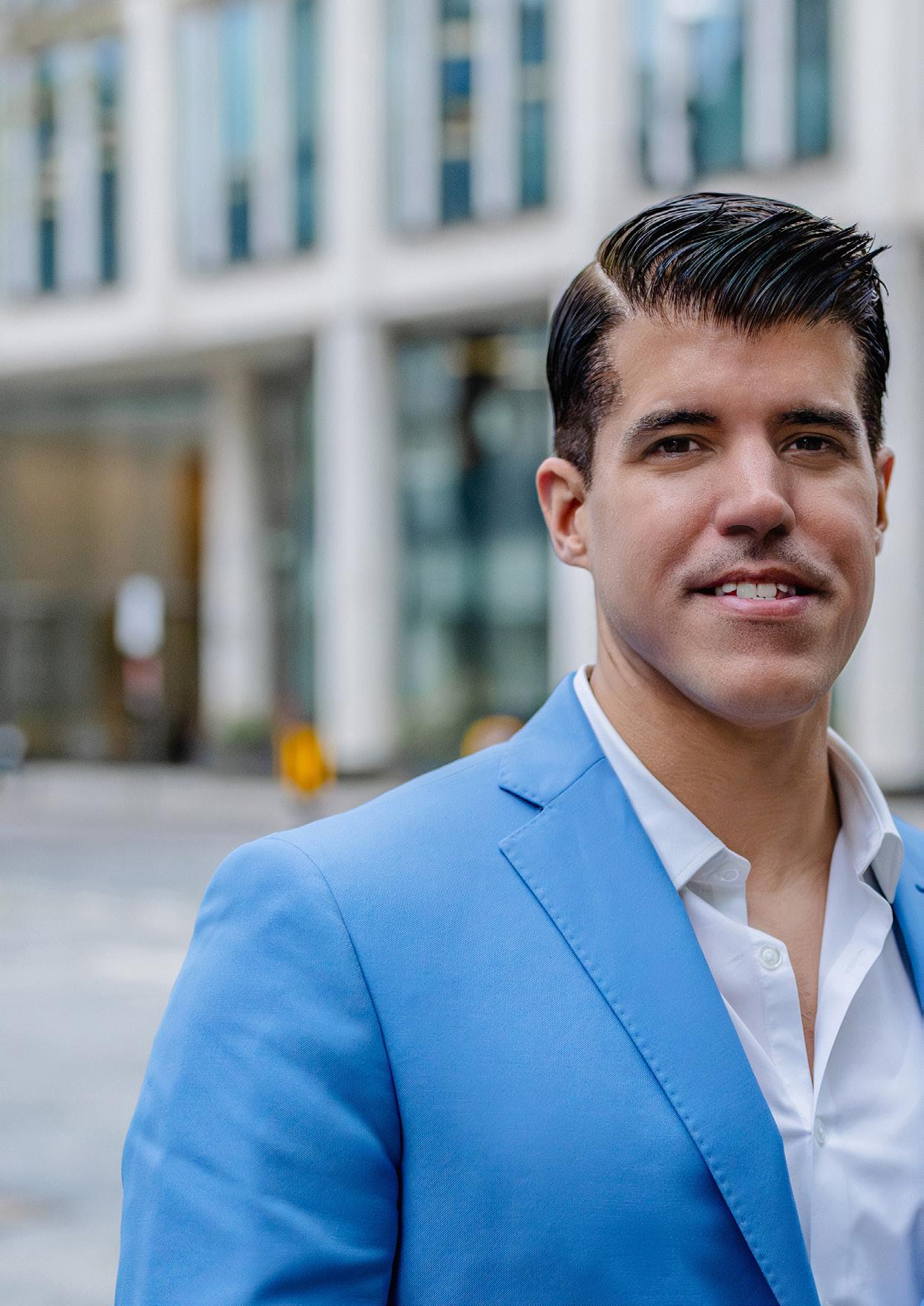
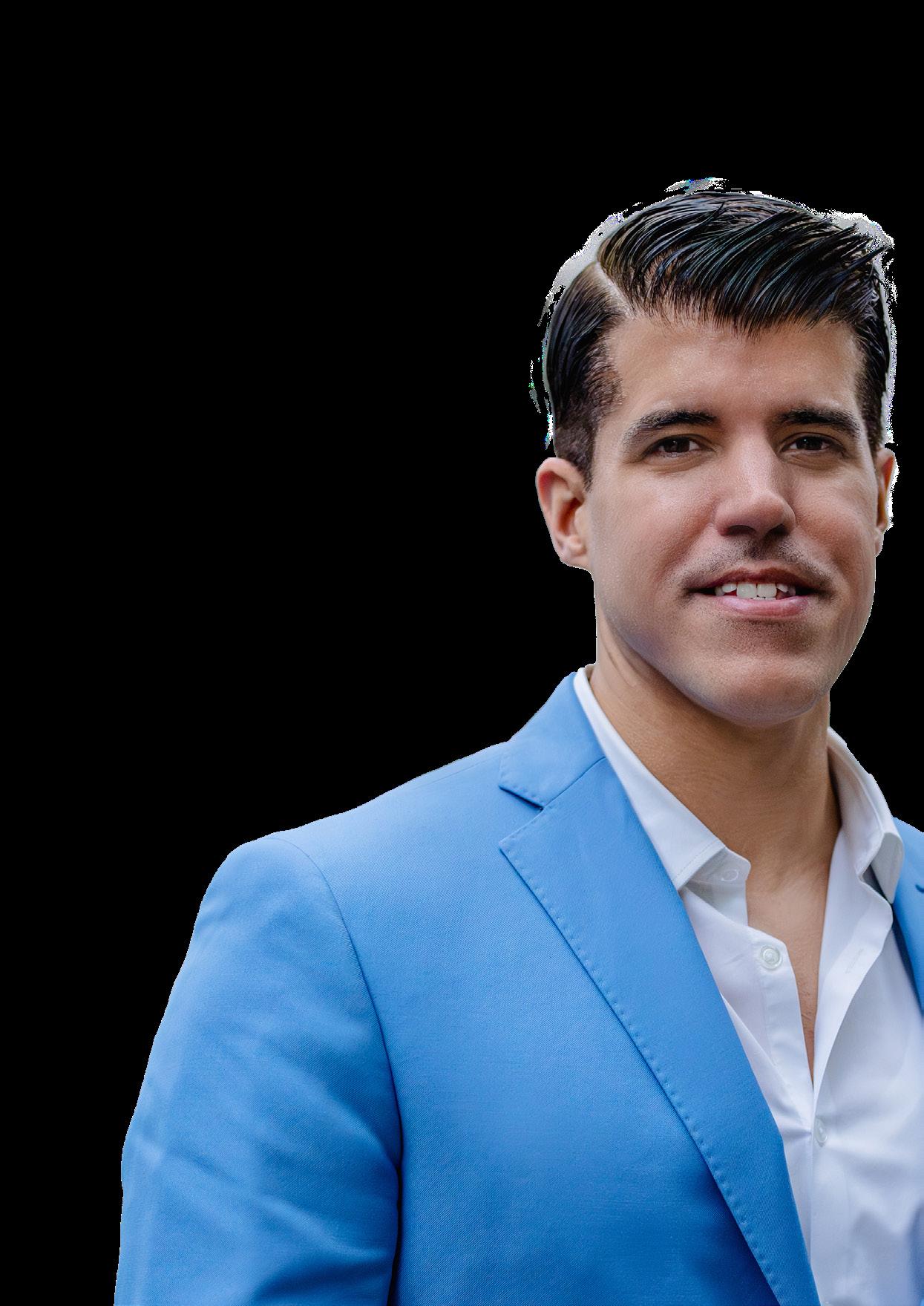
car today – not in 6 months, not in a year to get things into place’. We resolved to make Saphyre’s platform turnkey whether you are a global asset manager, a boutique bank, or a multinational custodian. When you adopt our technology, you can drive today – and you will realise the benefits. That makes the product real for an audience that tends to be skeptical of new technology.”
So, how exactly is Saphyre transforming the landscape of financial services? It’s a question that the Roche brothers tackle on a regular basis. So much so, that they have a short and a long version ready to pitch.
“What Saphyre does is instantly set up new and existing funds securely between external financial institutions, so that they can be ready to trade quickly, while eliminating post-trade issues,” says Stephen.
“Synchronising reference data in the pre-trade space eliminates much of the existing post-trade work, or redundancies, and provides critical groundwork for the move to T+1 in North America by May 2024.”
Saphyre's functionality for a client starts in the pre-trade space, before a trade even occurs, driven by intelligence rooted in more than 105 patents. For example, if a Fortune 500 company is setting up a new pension fund, the legal entity associated with that fund may need an investment management firm (many of the world’s largest are Saphyre clients). They also need to communicate with a custodian, who needs to then communicate with broker-dealers. It’s an intricate web of interfacing that is necessary for the whole machine to run.

Saphyre’s platform connects them all together to track that onboarding process: the Know Your Customer (KYC) protocols, the tax, legal, and
compliance work – as well as the operational setups including things like order management systems. It’s a proprietary system that is unrivalled in an industry where most of this process was historically held together by a disparate patchwork of emails, spreadsheets, and faxes.
All of that helps firms to get ready to trade quickly and – with certain markets, currencies, trading instruments and asset classes – that speed is a very important, powerful benefit to these financial institutions.
A significant benefit to this up-front work being done in the pre-trade phase is that it takes around 70 to 75% of the work out of the post-trade, too.
“The analogy that I like to give is that you should be treating trades the same way as air travel,” says Stephen. “You set up your security precautions before any threat occurs, use a black box, add AI intelligence, some automation – and you can ensure your trades land in the destination while eliminating most of the issues in the post-trade.
“Investments are currently being done in post-trade. In other words, they are in the business of putting together crashed planes and trying to get them to fly again. We're in the business of not having planes crash – ever. “
Certain industries are known to be laggards when it comes to embracing and adopting new technologies, and you could be forgiven for thinking that finance was not one of those. However, many processes are still in the relatively dark ages when it comes to digitalisation.
Gabino and Stephen both share anecdotes of some financial organisations being stuck in a time warp. This rocky horror show includes the use of faxes (remember those?), spreadsheets, and emails. This is not representative of the entire industry

of course, but it does highlight how Saphyre’s strategic relationships like FXall are using the platform to harness an entirely new approach.
Announced in February, the strategic alliance between Saphyre and the London Stock Exchange Group’s (LSEG) FXall business aims to digitise account onboarding for FXall clients through Saphyre’s AI technology.
“In the old days, you'd have to call up the banks to get the currency rates for different currencies,” says Gabino. “A platform like FXall actually draws from multiple liquidity providers to give you the best price. This is significant as it proves that Saphyre is now directly linked to trading activities, which is the breadwinning side of the business for a lot of financial institutions.”
Since that announcement, a growing number of other EMS platforms have started new formal discussions with Saphyre. Saphyre’s ability to serve multiple asset classes brings another value-add to its clients that was previously unmet.
Traditionally, many platforms are exclusively focused on certain asset classes. If a firm wants to do a certain type of trading and processing, you have to use certain solutions associated with that asset class – creating a messy network of multiple platforms within a firm’s framework.
Agility is one thing that Saphyre prides itself on, and if you want an analogy, you are not going to be disappointed.
“We move much faster than the generally accepted pace of things,” says Stephen. “We're like a speedboat doing several runs around a large cruise ship or oil tanker.”
Market forces are also, in a way, playing into the company’s hands –with turmoil in the US banking sector, ongoing geopolitical tensions,
and inflation spiking globally, to name just a few pain points. In periods of uncertainty, technology and innovation have a serious role to play, and a solution like Saphyre could prove instrumental.
Saphyre has been nominated for numerous industry awards, and Gabino has emerged as a consequential fintech influencer.
They were nominated for Fintech of the Year by Global Custodian magazine and won the highly coveted award in May 2023. They have also been featured by Forbes and the Wall Street Journal, while being regular faces on the cover of FinTech Magazine and keynote speakers at FinTech LIVE.
“Saphyre quickly became the dominant player in a market that was starved of true innovation, which is very important for us,” says Stephen.
It’s not all plain sailing of course, and while Saphyre has grown
exponentially in a short space of time, there are still challenges to overcome. The tactical solutions that Saphyre provides are plain to see in today’s financial environment. However, the financial industry’s historic aversion to adopting cutting- edge technology is also well known.
Right now, the firms that understand the strategic benefit are realising the first mover advantage. Although much of the investment being made by institutions today is focused on post-trade, Saphyre’s entire premise is built around the concept of solving these issues from inception, in the pre-trade first. With significant investments made in post-trade solutions, Saphyre is trying to bridge the gap – to get leaders thinking about the pre-trade.
Stephen says there is a major opportunity to show and validate post-rate solutions using pre-trade data, and that Saphyre is working
“SAPHYRE QU ICK LY BECAME THE DOM INANT PLAYER IN A MARKET THAT WAS STARVED OF TRUE I NNOVAT ION, W H ICH I S VERY IMPORTANT FOR US”
STEPHEN ROCHE PRESIDENT & CO-FOUNDER, SAPHYRE



#1 Saphyre won ‘Fintech of the Year’ at the Global Custodian Leaders in Custody awards in May 2023
105 Recognised patents 2017 Year founded in US
US$18.7m Series A funding
70-75% Amount of post-trade work Saphyre can eliminate
on an exciting securities lending solution right now.
“We're in the B2B space now, but this will also be repeatable to B2C. It's going to be very interesting. We are 90% there on setting that up. That will be something to look out for in the coming months, and it will be very exciting for this space, because that's a huge addressable market that hasn't been solved yet,” adds Gabino.

It all sounds like Saphyre’s stock is rising – despite economic volatility that would keep many financial executives up at night. But every crisis presents an opportunity and Gabino believes that the silver lining of today’s uncertainty could be perhaps the
greatest boon for fintech firms yet.
When reflecting on what he thinks about when getting out of bed in the morning, he gets enthused by the opportunity ahead that his team sees.
“Do we have our infrastructure in place with the right players to show how we can help them navigate these conditions in the market?” he says.
“Or if we haven't, how do we get those firms to quickly adopt us so that we can help them.
The account transition issues are ongoing in the market. Can a bank remember all the account information, data, and documents and can we digitally help assist clients on both sides of the angle – the banks and depositors do this seamlessly and
quickly? The answer is absolutely yes! These are the things that actually motivate us to wake up each morning.”
Stephen added, “People adopting our technology in advance of these kinds of crises will benefit from it. People who don't, will struggle, and would only then realise the change they need to make after the fact.”
“We work harder, smarter, faster to change the face of the finance industry because this is something worth striving for.”
saphyre.com
@saphyra
@saphyreinc
@saphyre7792

STEPHEN ROCHE PRESIDENT & CO-FOUNDER, SAPHYRE
“ WE WORK HARDER , SMARTER, FASTER TO CHANGE THE FACE OF THE FINANCE INDUSTRY BECAUSE THIS IS SOMETHING WORTH STRIVING FOR”
 AD FEATURE WRITTEN BY: ALEX CLERE
PRODUCED BY: MICHAEL BANYARD
AD FEATURE WRITTEN BY: ALEX CLERE
PRODUCED BY: MICHAEL BANYARD

Rewind for a moment, if you will, to 1898 – you’ll find that the world is a very different place. The US president is William McKinley; in England, Queen Victoria is into the last few years of her reign; and in the Netherlands, her third cousin, Wilhelmina, is embarking on what would eventually become a near-60-year spell on the throne. Meanwhile, in the Netherlands that same year, two Dutch banking cooperatives were inaugurated that would go on to form the backbone of one of the world’s largest financial institutions – one that, this year, is celebrating its 125th anniversary. Raiffeisen-Bank was founded in Utrecht and Boerenleenbank was founded in Eindhoven, originally acting as banking cooperatives to serve local farming communities.
Nearly 75 years later, the two would merge, taking the first two letters of their respective names to create a brand that is still familiar to this day: Rabobank.
When Bart Leurs, Rabobank’s current Chief Innovation and Technology Officer, dials in from his home office to talk about the company’s innovation strategy,
there’s a small parallel with the bank’s agri-heritage: he is speaking from Utrecht, where he lives with his family – and where Raiffeisen-Bank began its journey exactly 125 years ago.
Leurs is a seasoned banking executive who joined Rabobank in 2016, first serving as Head of FinTech & Innovation before four years as Chief Digital Transformation Officer. He has held his current role since September 2021. Prior to that, he spent almost two decades at ING, where he spent two years as Head of Strategy for ING Direct, followed by a number of senior positions within the company in Canada, Germany, and Belgium.
According to Leurs, that experience overseas has given him a deeper appreciation for the financial challenges in existence around the world, as well as an understanding of Rabobank’s reputation abroad.
“It really broadens your perspective of the world,” he tells FinTech Magazine. “It has really enriched my work and my life, in general, and given me new inspiration thanks to the different cultures and the different ways that people look at life.”
125 years after its founding, Rabobank is an immense organisation with international reach. Rabobank is one of the leading banks in the Netherlands with a focus on mortgages and SME lending. In 50 years, the number of local led Rabobanks reduced considerably, from 1,192 independent local member banks in 1972 to one Rabobank with 78 regional areas today.
Globally, Rabobank’s business is focused on being a food and agri bank, true to its roots as a farmers’ banking cooperative. As such, it’s heavily active in North America, South America, and Australia – parts of the world where food and crop production make up vital parts of the economy. But Rabobank finances all players throughout the entire food value chain, from farmers at one end to retailers at the other.
Rabobank’s balance sheet globally is more than €600bn and, last year, the bank made almost €2.8bn in profit from €12bn’s worth of revenue.
Despite its massive scale, Rabobank hasn’t allowed its growth to diminish its cooperative heritage or dampened its core values; in fact, the business still operates with much the same mindset today as it did over 100 years ago.
“The idea behind the cooperative was to fix things together that you cannot fix alone,” Leurs explains. “At that time, it was bigger farmers helping smaller farmers to access credit so they could build and grow their business. Of course, we have grown to
be a much bigger bank that’s not only focused on food and agri anymore, but that has broadened its scope and its activities. But the mentality and culture of a cooperative –of fixing things together – still exists within the organisation.”
In part, he credits Rabobank’s success to its operating model, which is unique among global institutions of this size. As a cooperative, Rabobank exists for the mutual benefit of its members. Unlike listed companies, this means that it’s able to take a more strategic long-term approach rather than focusing on just short-term profits. You occasionally see that distinction in family-run businesses as well, Leurs points out.
Over time, the cooperative’s main priorities have evolved, even while its focus on food and agri have remained the same. Today, Rabobank has its eyes firmly set on deep-set social issues that affect all of society – including food security and energy security.
According to the United Nations’ Food and Agriculture Organization (FAO), food security remains one of the most pressing concerns in today’s world. Its latest update, published at the end of 2022, lays bare the issues facing the global food supply chain:
“Malnutrition in all its forms remains a challenge, and child malnutrition, in particular, is expected to be higher due to the effects of the COVID19 pandemic,” the FAO writes. The report continues: “Climate change poses the greatest

“THE IDEA BEHIND THE COOPERATIVE WAS TO FIX THINGS TOGETHER THAT YOU CANNOT FIX ALONE”
BART LEURS CHIEF INNOVATION & TECHNOLOGY OFFICER, RABOBANK

threat to rural small-scale producers, particularly poor and vulnerable communities. This pressure comes through increasingly frequent extreme weather events such as droughts, storms, and floods, as well as gradual changes such as shorter rainy seasons, delayed onset of rain, rising sea levels, and melting glaciers.”
Facing this complex combination of risk factors, it’s clear to see why food producers and other stakeholders within the food supply chain need financing from a reliable partner like Rabobank. “We are the biggest bank around the world in food and agri, and we deal with all the players in the food value chain – from the farmer up to Walmart,” Leurs says. “We see that, with a growing population plus issues around sustainability and being able to feed the world within the bounds of the planet, there’s really a role for us as a bank.” Part of Rabobank’s role in that mission is supporting the food producers it works with to be able to play their part in the fight against climate change,
and, in particular, stick to the Paris Accord goal of keeping global warming below +1.5°C compared to pre-industrial levels. As well as providing financing and knowhow, Rabobank also encourages companies to play their role in the green transition by nurturing accelerated innovation.
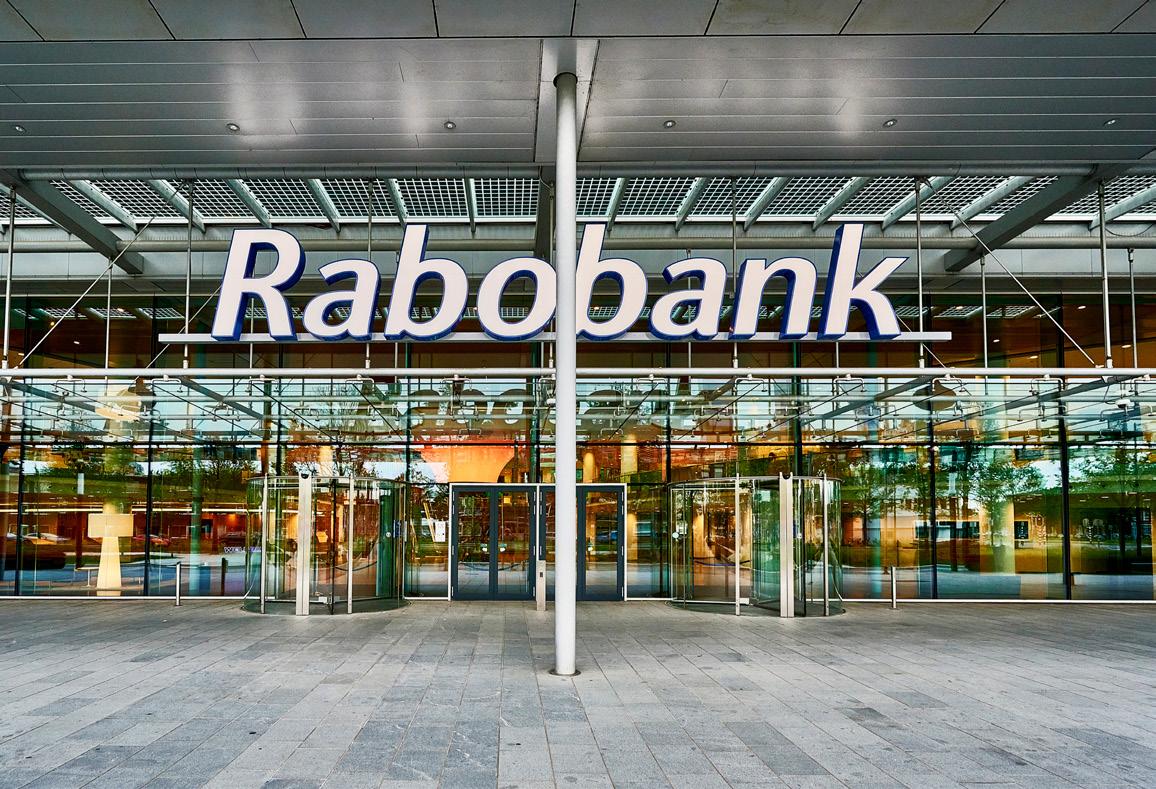
“At this point, more than 60% of our innovation projects are geared towards that transition,” Leurs elaborates, “towards making the food value chain more effective and more sustainable in the future.”
In the same report, the FAO also pinpoints energy security as a major global concern. The two are very closely linked; food production is a resourceintensive industry, meaning fluctuations in wholesale energy prices – as we have been seeing since the beginning of the war in Ukraine – have a major impact on farmers, growers, and food producers.
“Agri-food systems are becoming more energyintensive,” the FAO report says, “and this has implications for food prices, as well as for the environment. On the one hand, several studies have highlighted the relationship between energy and food prices, and the recent hikes in food prices have been pushed up by increases in energy prices. On the other hand, it has been estimated that almost a
BART LEURS CHIEF INNOVATION & TECHNOLOGY OFFICER, RABOBANK“YOU CAN ONLY BE SUCCESSFUL AND IMPACTFUL ON INNOVATION
WHEN IT’S LINKED TO THE MISSION AND STRATEGY OF YOUR ORGANISATION”
third of the emissions of the global agrifood system comes from energy-related activities.”
One thing we can do is reduce the amount of water needed for growing crops, and transitioning to renewable energy wherever possible within the food value chain. But the FAO also highlights the source of energy for cooking as a problem: in 2019, a third of the global population relied on wood, charcoal or agricultural residues for their household cooking needs – a demand that, in some cases, outstripped the abundance of natural supply.
Explaining how Rabobank empowers the energy transition,
Leurs says: “We are one of the biggest financiers of wind farms around the world, but we also have the obligation of making sure that we bring clients with us in making this huge transition to a more electrified world. In energy security, our knowledge is younger than it is in agri-food, but we can still have a major impact and we know we already have a strong position.
“That’s why we have chosen those two – agri-food and energy – as the main transitions to bank on for the future. We know that, if we do a good job with our clients in those two areas, we will also do a good job for the planet.”
TITLE: CHIEF INNOVATION AND TECHNOLOGY OFFICER
Bart Leurs, Rabobank’s current Chief Innovation and Technology Officer (CITO), joined Rabobank in 2016, first serving as Head of FinTech & Innovation before four years as Chief Digital Transformation Officer. As CITO, Bart is leading the change to continuously improve the effectiveness of the bank's 'Tech engine' and is driving the organisation to innovate and make use of the possibilities of Tech & Data. He has held his current role since September 2021. Bart previously worked at ING, leading various business departments. He has over 20 years of experience conceiving and delivering new and innovative digital services at banks.
Leurs joined the business in October 2016, and since then, he knows that there have been improvements. Even from the beginning, Rabobank has always been an innovative organisation: it was the first bank to offer internet banking and ATM withdrawals to its clients in the Netherlands; and it pioneered a payments system called iDEAL, which has become instrumental to transactions, taking less than a decade after launch to capture 50% of online payments made in the country. But it hasn’t always got everything right.
“We have made lots of mistakes and had quite a lot of setbacks,” Leurs freely admits, “but we have tried to learn from every single one of them.
“When I joined Rabobank, it already had a strong history of innovations. But my perception coming into the bank was that innovation was very disorganised. We were doing lots of different things in different places, and it was very tech-driven. Innovation was part of our IT department, and there was no structured way of bringing innovation to fruition. In that respect, we moved from being an organisation of inventors – people who create technical solutions without much coordination – to being an organisation that has a mature innovation governance with seasoned innovation professionals.
Leurs says that, in those days, innovation within Rabobank lacked direction. “We collaborated with tech startups and tried a bunch of different things just to generate power and enthusiasm. However, we

learned that you can only be successful and impactful on innovation when it’s linked to the mission and strategy of your organisation,” he says.
In the intervening years, Rabobank has worked on a number of different approaches. One is to ensure that every innovation project is intrinsically linked to the bank’s mission and strategy – and to those important transitions of energy security, food security, and financial inclusion for all; the other is to view innovation as a craft.
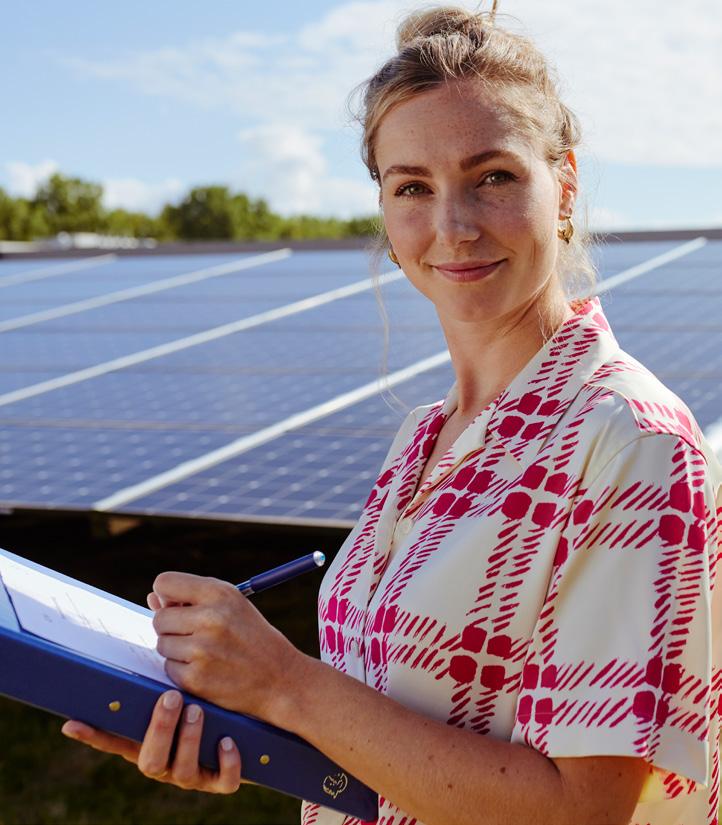
“I believe you can learn innovation, but you need discipline and structure. Things don’t just happen by accident. We’re not all Steve Jobs. You have to get a sense not only
of how you generate ideas, but also how you validate (or invalidate) them quickly and integrate them with the mission of the organisation.
“We have organised ourselves quite well. We started with the concept of ‘business-led’ innovation, and we said we’re not going to build projects outside the organisation that are not being inherited by the mothership. We’ve really set business-led innovation as the key.”
Building ‘the machine that creates the unicorns’ Within Rabobank itself, there are a number of separate work streams that help the bank dial-up its innovation efforts. The first is called the
‘Innovation Factory’. Rabobank has recognised the need to ‘industrialise’ innovation, so it has assembled a talented team of innovation experts with experience in founding startups, building and scaling corporate ventures and shaping partnerships with fellow innovators. These experts accelerate Rabobank’s internal ventures including scouting and shaping partnerships via its Open Innovation activities. “It is the machine that creates the unicorns,” he jokes.
Then the company has a corporate venture fund, Rabo Frontier Ventures, that is investing in early-stage fintech companies and several venture capital funds, as well as an open-innovation ecosystem that allows it to bring external innovators into the business and give them the chance to start working with Rabobank.
“We have organised innovation portfolio management,” Leurs continues. “We have a funnel where we’re constantly looking at how many innovations we have and in

BART LEURS CHIEF INNOVATION & TECHNOLOGY OFFICER, RABOBANK
“OUR INNOVATION FACTORY IS THE MACHINE THAT CREATES THE UNICORNS!”
which phase of development –whether they’re just starting an innovation project or scaling up within the organisation.”

Innovation has its own centralised budget allocated that is ring-fenced, meaning other tech projects within the bank don’t eat into innovation. The bank’s innovation leads are connected to board members, ensuring that there’s corporate buy-in for major innovation projects. And the bank isn’t afraid of letting go where it needs to: take the example of Peaks, a retail investing app where Rabobank was an early-stage backer. Rabobank itself was not able to turn the company into a success and, recognising that there was a better place for Peaks, chose to sell its stake in the company to allow the fledgling fintech to fly.
“With the challenges that we face in the world today, there’s always a need for innovation, so I don’t think we’ll ever slow down. We will always need innovation to continue making those energy and food transitions a success, so I don’t
see a world where we will never need to innovate.
“Of course, that doesn’t mean you can’t be sensible with what you spend and what you get out of that expenditure. We’re super-realistic. If we see that our innovation projects aren’t moving fast enough throughout the year or we’re not going to use up our allocated budget, we give it back to the organisation. We don’t need to use up our budget to show that we’re successful. But I think it would be naive to think you can just pause your innovation. I don’t think that’s an option in today’s world.”
From Leurs’ perspective, this cooperative mentality makes Rabobank ideal for outside partners to deal with – whether that’s startups, consultants, or innovation enthusiasts. That doesn’t mean that new relationships are always seamless, though. Any organisation of Rabobank’s size would find it difficult to integrate with young, agile entrepreneurs
– particularly those that are used to moving at pace, and less experienced in dealing with a heavily-regulated industry that has internal safeguard layers, protocols, and approval procedures.
“We have had a number of successful collaborations, but we have also had some failures around collaborating with startups, too. We always start with good intentions, but, sometimes, it can be a difficult thing to marry the small with the big.”
Leurs believes that innovation is baked into Rabobank’s DNA. It’s an integral part of the way it does business. “I honestly think that the cooperative culture in the organisation translates into our people being willing to work with teams, to help each other get results. That, in the end, is what you need to get great innovation and great new ideas.”
rabobank.com
@rabobank
@Rabobank @rabobank


With markets, behaviours and customer demands changing quickly, financial institutions need to act with speed. And with McKinsey predicting the pace of change in the banking industry will speed up significantly over the next few years, banks and lenders need a solution that helps them stay ahead of the curve.
Mambu is a SaaS, cloud-native, APIdriven banking and financial services platform, designed to power financial innovation, bring solutions to market faster, drive down cost barriers and allow ecosystems to expand.
“I’m a firm believer that the core banking world is very niche,” explains Nick Lawler, Mambu’s Market Sales Director for UK&I. “What we do, we cannot do as any one individual. And that’s the same for any one business.
“No one person can deliver a transformational change to a bank or a building society or a financial institution. You need to look at the
wider ecosystem. That’s my role, pulling it all together, and that’s essentially what Mambu does as well.”
Founded in 2011, today Mambu’s customer list includes fintech startups, telcos and top-tier banks, operating on six continents and helping customers constantly change the way financial institutions operate and innovate.
As Lawler explains, offering a completely open architecture, Mambu is a different type of banking solution. “Some people back in the day, or even now, will choose to selfbuild a system in-house. But if you build a system in-house, you are reliant on those people that built it, retaining their skillsets and knowledge.
“For some people, a modular approach works. But there are other people out there who want to embrace this modern technology. And that’s where we come in with composable banking.”
A term coined by Mambu, composable banking provides
Mambu offers a different type of banking & lending solution

With the current turbulent economic times, Mambu’s SaaS solution is helping financial institutions act quickly, launching and scaling products at speed
components that can be selected and assembled in various combinations to satisfy specific user requirements.
“We do across-the-board current accounts,” Lawler explains. “And we support lenders through one single code base. It’s one platform globally, it’s SaaS. We regularly push new releases to make sure our clients are on the latest version. That’s part of what we do.”
With the current turbulent economic times, financial institutions are having to act quickly, launching and scaling products at speed. As Lawler describes, Mambu provides financial institutions with the flexibility to build a product quickly, launch it to market, and test it, all in a true SaaS model.
“What we’ve seen is there’s a big change in the market that works for both mortgages and savings,” he says. “The interest rate changes we’ve seen have meant mortgage rates have increased. So that means mortgage lenders are pulling their products, they’ve got to launch new products quickly and put them to market.
“But on the flip side of that coin, rates are going up on deposits. They’ve been at historic lows, which now means people need to react
quickly to the market. You’ve got to be competitive, otherwise your deposits are losing, and customers may leave your business and go to the next bank that is quicker to market with a better product.”
Changes like this in a legacy stack take time. “There might be lots of testing, you might have to go back to your vendor, and it can take weeks.
“In the market, weeks is a long time,” Lawler explains. “Suddenly either you haven’t had the mortgage product you want on the market and you’ve been selling at a lower rate, or your savings rate is paying too little, which means people are going to your competitors."
With the global lending market expected to reach US$8.9tn in 2025, and US$11.6tn in 2030, flexibility is key for businesses looking to enter or expand in the personal and business lending spaces.
“What Mambu is doing is allowing financial institutions to have the flexibility to build a product quickly, launch it to market, and test it in this SaaS model,” Lawler comments.
“Mambu is a configurable solution. If you had a bank that is wanting to have freedom in their choices of how they serve their customers to work

with their own originations partner or build in-house or do their own use flows on digital banking, Mambu supports that.
“Whether it be a mortgage application or a deposit application, we can support that, power it, we can take the relevant customer fields in,” he says. “We allow our customers to basically be their own institution, support their own needs, but powered by a global solution.”
As Lawler explains, ultimately the goal for Mambu is to give power to its customers. “A customer will have the same solution in Brazil that they will in the UK or in Australia. But each of those customers will be using that solution in a slightly different way and then putting orchestration and configuration around it for the way they want to work.
“What we give them is that freedom. From a mortgage perspective, they might be tied into legacy stacks with big change requests, and delays in product changes. We remove that for them, we allow them to update products quickly, and plug-and-play withthe partners they choose.”
With its cloud-native platform, Mambu allows financial institutions
“WE SUPPORT LENDERS THROUGH ONE SINGLE CODE BASE. IT’S ONE PLATFORM GLOBALLY, IT’S SAAS”
NICK LAWLER MARKET DIRECTOR, MAMBU
TITLE: MARKET DIRECTOR
INDUSTRY: SOFTWARE DEVELOPMENT


LOCATION: UK
Nick Lawler is the Market Director for Mambu UK and Ireland. He has spent more than 20 years in the finance industry, working for brands such as NatWest, Merrill Lynch, Moneyfacts Group and Fiserv. With a focus area in business and technology development, he joined Mambu in 2021 to support the growth and adoption of SaaS banking technology in the UK.
linkedin.com/in/nick-lawler-26b04335
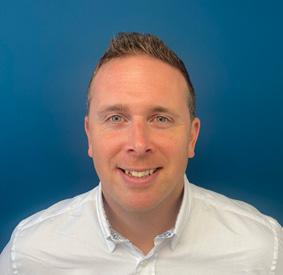
to constantly improve and be nimble and ready for change as it happens.
“From a deposit angle, rates move quickly,” Lawler explains. “And it works both ways. You might find yourself at the top of the best-buy table. Perhaps you don’t want to be number one, in which case you can pull the product, and put a new one on market. Or perhaps you want to be number one because you want to do something on your lending line or to launch an aggressive product. We’re there to support it all the way through.”
Recent news about crises in the financial sector, from the collapse of Silicon Valley Bank to the bailout of Credit Suisse, has highlighted the turbulent economic environment in which we inhabit. As Lawler explains, the UK and Ireland are at the forefront of banking and technology. “We are a heavilyregulated, stable environment,” he comments. “We saw what happened with Silicon Valley Bank, they had a situation that would not have been allowed in the UK. ”
From a Mambu perspective, numerous financial institutions have chosen its platform to help them bring solutions to market faster, drive down cost barriers and allow ecosystems to expand.


“We have seen a wave of new entrants, and we have powered
the bulk of those,” Lawler says. Since the wave of new players in the market, the number of new banks has slowed in the UK as the market changes. “But from a Mambu perspective, we signed 48 new logos, and any core vendor globally would be chomping at the bit to get that traction,” Lawler adds.
As the launch of the new banks has slowed, Mambu is looking at innovating with new solutions in the brownfield space.
“We are now stepping up and working, not just with greenfield
“IN THE MARKET, WEEKS IS A LONG TIME. SUDDENLY EITHER YOU HAVEN’T HAD THE MORTGAGE PRODUCT YOU WANT ON MARKET AND YOU’VE BEEN SELLING AT A LOWER RATE”
NICK LAWLER MARKET DIRECTOR, MAMBU
projects, new entrants,” Lawler explains. “We are also moving into the brownfield, true transformational migration plays in the UK, which tend to be riskier.
“People are seeing the strength in the Mambu solution. We are helping to move large financial institutions away from legacy technology stacks, and people are seeing the benefits and they have belief in it.
“We haven’t just rebadged something. We are a true modern stack,” he says. “We are going to continue growing within the region. We’re going to continue maturing the solution, and the people around us, growing as a business, which is an exciting step for Mambu.”
With financial institutions looking to modernise, a lot of it comes down to cultural change within the business. “You will have people who’ve worked


in a bank for 10 or 20 years who will have never been through this process,” Lawler explains. “They’ve only worked on one system and that system is all they know. People will be nervous from the board level to the grassroots.
“That’s where we come in. We support that. And we’ll continue to do that over the next year and beyond.
“We are not just a vendor, we are a partner. From Customer Success and Customer Value to Partnerships, we continue to stay with our customers and work with them and make sure we’re doing the best for them.” mambu.com

The CEO of international payments business TransferGo shares his story with us
Q. Describe your journey into fintech. How did you get here?
» Before starting TransferGo, I was running an import-export business, and making payments internationally was a challenging undertaking. I realised that the system was stacked in favour of traditional financial institutions, and I thought that it was ripe for disruption. The more I researched, the more I was convinced that there was a sizeable opportunity for a fintech to offer fast, low-cost and convenient international payments.
Q. Who was your childhood hero and why?
» Ever since I was young, I have admired Steve Jobs. He had a unique ability to make the future, and all the innovation it may bring, feel as though it’s within easy reach. When he spoke, he could transport an audience into a new and exciting world that is not yet here. It’s such a rare skill but it’s a critical trait for any ambitious entrepreneur who wants to bring their customers along with them on their journey.
Q. What's the best piece of advice you’ve ever received?
» I was once told that people often overestimate the ups and downs in business, and over time, I’ve come to realise that it’s true. The highs are never quite what you imagine, while the lows do not have to indicate the end of the world. That means that leaders should seek to take more
risks, especially during the early stages of a business, embrace failure as you do success, and realise that if the worst outcome is having to move back in with your parents for a short while, then you can learn from the experience and put it into practice in your next venture.
Q. Who do you look up to in terms of leadership and mentorship?
» There are too many people to name but I am incredibly pleased to be working alongside an experienced board who bring knowledge and experience from the industry, and teach me new things every day. Self-development is a critical part of any leadership role, and I make sure it is part of my job description.
Q. Is there a personal achievement from the past 12 months of which you are particularly proud?
» Ukraine has always been a large part of our business. When the war broke out, I’m proud of the job we did to ensure our staff, with families back in Ukraine, had the
support and resources to evacuate, should they want to leave. We also worked non-stop with our Ukrainian banking partners so that we could continue to support our customers there and keep money flowing into the country. We did all of this without making a big fuss about it or trying to promote ourselves, unlike some other businesses.
Q. What inspires you in fintech today?
» Our mission – supporting migrants and making the world fairer for them – is more important today than it has ever been. Political, demographic, economic and even environmental forces are going to mean that migration continues to shape economies and societies across the globe. We’ll be there to help and ensure that people can move money around quickly and affordably.
Q. Name one piece of technology you couldn’t live without (besides your mobile phone)
» I’m going to have to cheat and say my mobile phone – I couldn’t live without it!
Q. What’s next for you?
» I’m focused on the next 10 years at TransferGo, ensuring that we’ve got the best team in place to deliver new products and serve new markets. We’ll have some exciting announcements soon, so watch this space!
“Describe myself in three words? Driven, direct and inquisitive”


20th June 2023 11am ET / 8am PT
Agenda
• Setting the foundation and groundwork for creating a working model
• Building the processes & measurements to adapt new use cases
• Modern data quality considerations: From observability to remediation

• Data Integrity at scale: Requirements for sustainable compliance






